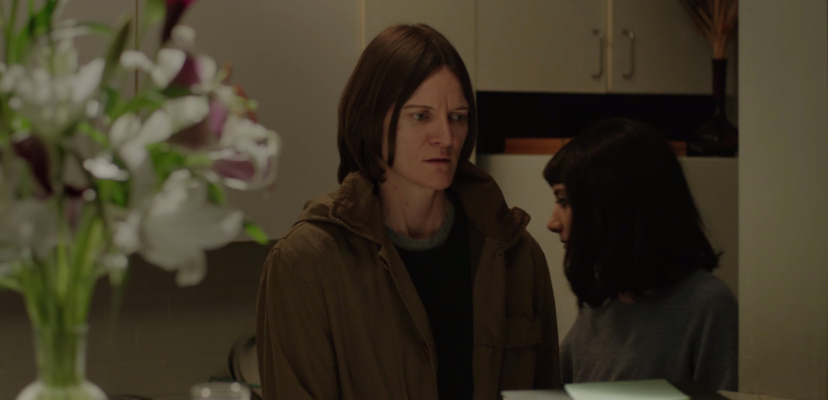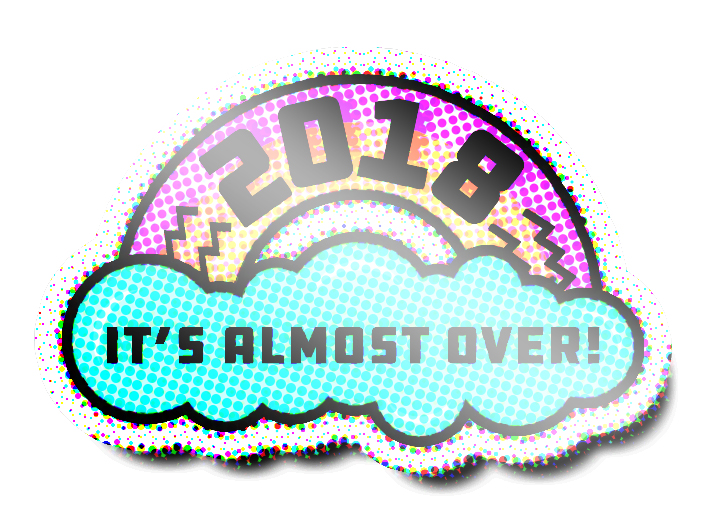“In short: This gorgeous movie featuring two famous Rachels and lesbian spitplay will probably make you cry. It’s sad throughout but not exactly tragic. The ending, like any good one, is open to interpretation without being wishy-washy. One last urgent, desperate kiss says more than Esti and Ronit can bring themselves to utter. The invisible thread between them persists.” — Kayla Kumari Upadhyaya
The 50 Best Lesbian, Queer, and Bisexual Movies of the Decade
I just want you all to feel seen.
It’s corny, it’s cliché, but it’s true. I want every lesbian, every queer woman, every non-binary person, I want us all to know that our stories matter, and that they’re being told, and that they’ve always been told, and that we deserve even more.
Whenever I’ve said to someone I was working on a Top 50 Lesbian+ Films of the Decade list I’ve been met with the same question: Were there really that many?
The answer: Yes, of course.
But there’s a follow-up question worth asking: If there were that many lesbian movies, why does it feel like there weren’t?
The fact is most of the films about us — and especially the films by us — do not get the attention they deserve. They don’t get the budgets they deserve, the awards they deserve, the acclaim they deserve. But that’s why we exist — that’s why Autostraddle exists — because while we may not be able to fund the trans lesbian action movie of your dreams, we can remind you of the rare queer films that joined the zeitgeist and we can bring your attention to all the others you may have missed.
The “short” list voted on by the entire Autostraddle team was 171 films. Voting took place in two parts: Everyone gave each film they’d personally seen a rating out of ten stars and then chose their top five favorites. The overall ratings were used to put together one list and the favorites were used to form another. Then those two lists were combined for what you see here. Films that had many people rate them were also weighted slightly higher on that list.
The intention of this algorithm was to prioritize films featuring underrepresented groups while still not discrediting popularity. I wanted this list to bring attention to our favorite underdiscussed movies, but also for it to act as a definitive reflection of the decade in lesbian+ cinema.
It’s worth noting how many of the films allowed us to actually tell our own stories. Here are a few stats for you:
+ 31/50 films feature out queer women or non-binary actors in major roles
+ 26/50 films were directed or co-directed by queer women or non-binary directors
+ 11/50 films were directed or co-directed by queer women or non-binary directors of color
There are four queer directors who each have two films on this list: Desiree Akhavan, Ruth Caudeli, Madeleine Olnek, and Dee Rees. There have always been queer women auteurs (*cough* Dorothy Arzner *cough*) but it’s exciting that there are now multiple filmmakers getting the access to build extensive filmographies of explicitly queer cinema.
These numbers highlight that nobody is better equipped to tell our stories than we are. Hopefully, the next decade brings less of a divide in regards to budget, genre, and awards — in this decade the higher the budget, the more likely the movie was directed by a cishet man. I also hope the next decade has more movies with queer characters who are POC, trans, and disabled.
Well, without further ado – here is the Autostraddle Best Lesbian+ Films of the Decade.
50. Women Who Kill (dir. Ingrid Jungermann, 2016)
As a fan of The Slope, I wasn’t sure what to expect when I found out Ingrid Jungermann’s debut feature was going to be a thriller. How would her comic slice-of-life sensibility fit within a heightened genre? Turns out – very, very well. Still as funny and sharply observant as her other work, Women Who Kill, captures the horror of trust issues. Sheila Vand is excellent at one moment being mysterious, alluring, and possibly murderous and the next moment just being a troubled woman trying to fall in love. Her contrast with Jungermann is really fun to watch, and, ultimately, rather heartbreaking. It works as a comedy, it works as a thriller, and it works as an emotional drama about a doomed queer romance. – Drew Gregory
49. The Summer of Sangaile (dir. Alante Kavaite, 2015)
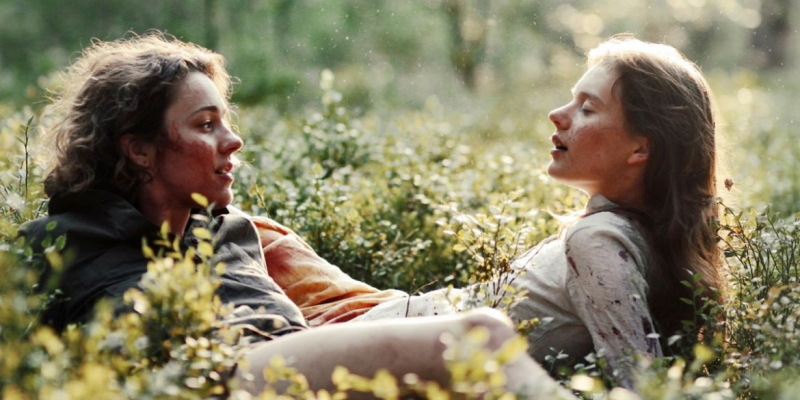
Alante Kavaite’s coming-of-age story about a queer teen obsessed with airplanes – and scared of heights – is deeply angsty and breathtakingly gorgeous. The lighting, the aerial photography, the costumes, the score, all make for a sensory experience that places you in the troubled mind of Sangaile. It’s a lovely tribute to the power of feeling truly seen, and an honest reflection on the limitations of love. Sangaile’s self-harm is handled with a fascinating balance of weight and levity. The film doesn’t minimize her mental illness or the severity of her actions, but it also never judges her. She’s a complicated person, right in the middle of the worst period of her life, and she’s trying. Julija Steponaityte and Aiste Dirziute are great as Sangaile and her new love, Auste. They have a chemistry that never quite clicks as we the audience understand their attraction and the limits of their teen summer romance. Sometimes love isn’t meant to last, but the few months we spend with a person changes who we are – who we can be – forever. – Drew Gregory
48. Wild Nights with Emily (dir. Madeleine Olnek, 2018)
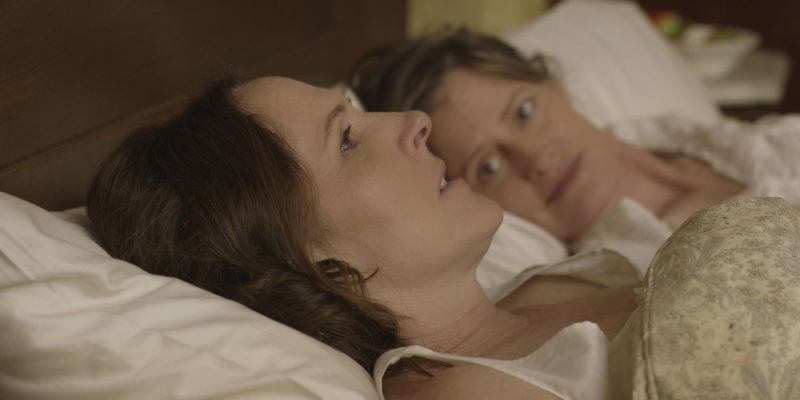
Emily Dickinson’s queerness is really having a renaissance right now! But before Apple TV’s brilliant (and awesomely weird) TV series starring Hailee Steinfeld as the beloved poet wooing her brother’s girl with her poetry and wit, Molly Shannon starred in an even queerer and weirder adaptation of Dickinson’s life. Writer/director Madeleine Olnek’s brand of quirk is singular and she brings all of it to bear on Wild Nights With Emily, challenging not only the deliberate erasure of Dickinson’s gayness from the historical record, but also the idea that Dickinson was a dour, virginal spinster. In Olnek’s view, and in Shannon’s hands, Dickinson is no angsty recluse; she’s silly and compassionate and brilliant and warm and wise and full of life and wonder. Wild Nights is both ridiculous and completely resonant. Truth told just the way Dickinson liked it — at a slant. – Heather Hogan
47. Grandma (dir. Paul Weitz, 2015)
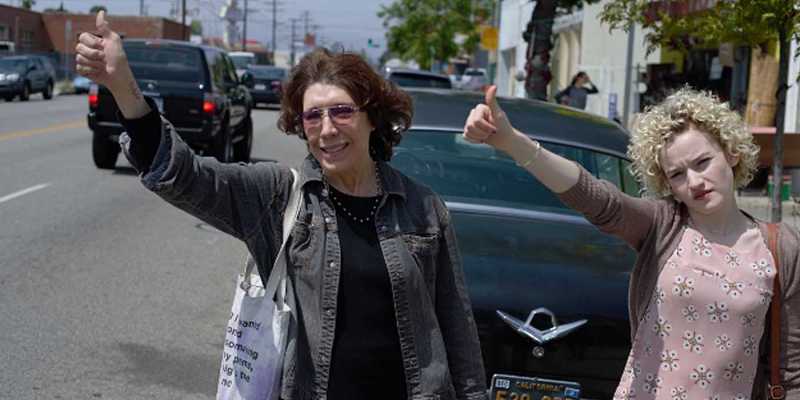
I can’t really explain why I love Grandma as much as I do. Actually, that’s not true — I absolutely can, and I can do it in two words: Lily. Tomlin. If you’re a fan of the lesbian comedian, then you absolutely cannot miss what’s perhaps her finest role. In Grandma Lily Tomlin plays, well, a lesbian grandma (obvious, I know!) who abruptly puts everything on hold to help her granddaughter with a life-altering favor. It’s chopped full with Tomlin’s signature quirky warmth, but also there’s a seriousness underpinning her performance that you don’t always get to see in her other work. Did I mention it also has a guest starring role for Laverne Cox? If you ask me Cox’s comic timing is criminally under appreciated, and in Grandma it’s in fine form. – Carmen Phillips
46. Annihilation (dir. Alex Garland, 2018)
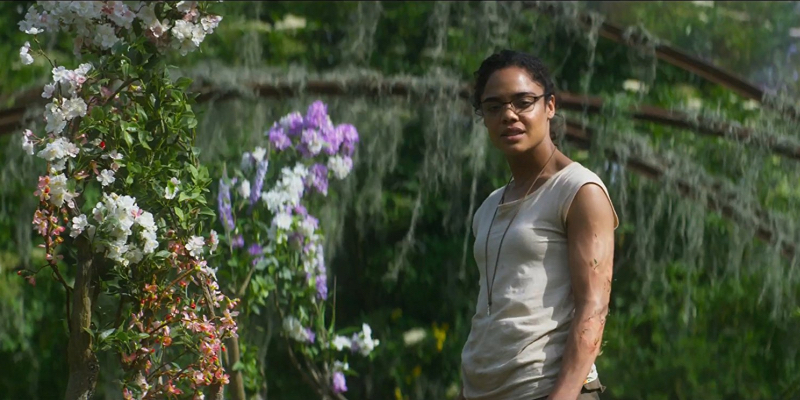
Annihilation mutates several times over the course of its sci-fi-horror story, jumping around in times and tones but ultimately spinning an unsettling and gorgeously constructed narrative on identity and self-destruction. At its climax, the film delivers one of the most haunting, dialogue-free film sequences of the decade, one that lends itself to myriad interpretations. Its score is phenomenal, as are its performances, which ground the movie despite all the sci-fi weirdness unfolding throughout it. Tessa Thompson and Gina Rodriguez bring specificity and stakes to what could easily be set-dressing characters, and the latter harnesses a major tonal shift halfway through the movie with a classic manic horror performance. – Kayla Kumari Upadhyaya
45. Kiss Me (dir. Alexandra-Therese Keining, 2011)
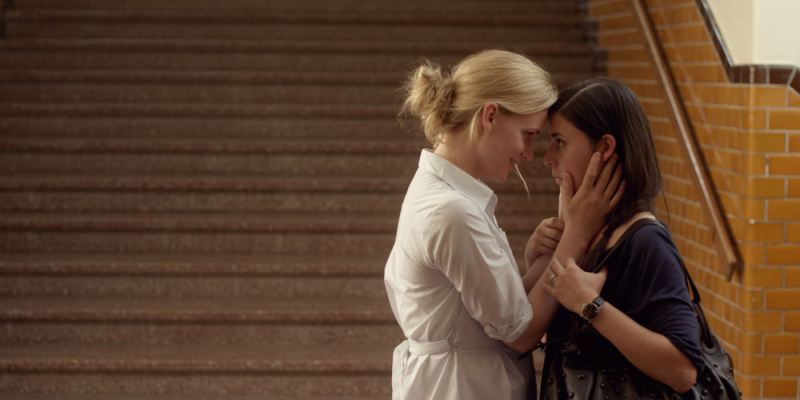
Kiss Me is the kind of lesbian movie we as a community tend to mock. A woman engaged to a man suddenly falls for a lesbian she’s tangentially related to? It’s become its own niche cliché. But the writing and performances in Kiss Me elevate it beyond its premise, or, rather, show why this premise is so attractive to filmmakers in the first place. There’s a truth to Mia’s confusion and Frida’s impatience. The situations that are usually used as plot hurdles instead deepen the characters. Who is this queer person so deep in the closet? Who is this other queer person falling for her? Should they even be together? This is a fun and sexy romance that doesn’t require you to turn off your brain – but might turn it on. – Drew Gregory
44. Can You Ever Forgive Me? (dir. Marielle Heller, 2018)
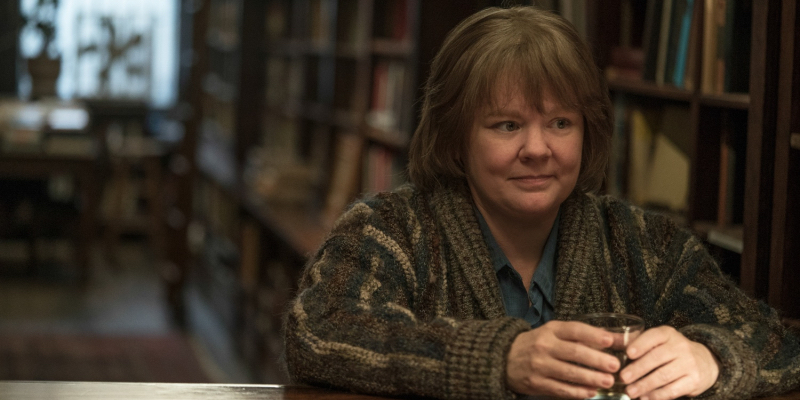
More movies should be as subdued as Can You Ever Forgive Me?, a charming comedy about an incredibly un-charming, real-life protagonist played by Melissa McCarthy in one of the best, most severe roles of her career. The movie lets biographer Lee Israel be acerbic in the way only tortured male artists usually get to be, but it also acknowledges the consequences of her intimacy issues, especially when it comes to her ex-girlfriend (Anna Deavere Smith), new love interest (Dolly Wells), and friend/co-conspirator (Richard E. Grant). Can You Ever Forgive Me? touches on financial anxiety, sexism in publishing, and forgiveness in its sharp but subtle storytelling where the relationship dynamics do the heavy-lifting. It’s a heist movie that feels incredibly low-stakes, and that’s part of its charm. – Kayla Kumari Upadhyaya
43. Atomic Blonde (dir. David Leitch, 2017)

It’s no secret that the plot of Atomic Blonde is incredibly unhinged and, frankly, incoherent, but I’m a true believer in the fact that queer women should be visible in all film canons, and that includes shitty action movies that are nonetheless thrilling, stylish, sexy, and impecably choreographed. Hand-to-hand combat scenes don’t get much better than this, which makes sense given that its director is a stunt performer and coordinator. Atomic Blonde is a rare action movie that’s aware of its characters’ bodies not just in terms of them being capable and attractive but as being fallible, too: How often do we get to see bodies tire and bruise in action? The film falls prey to all sorts of tropes (including That One), but a queer love story that gets to be emotional and hot woven into a flashy world of spy thrills is still, unfortunately, remarkable. And yes, Charlize Theron’s many coats worn in the movie deserve accolades on their own. – Kayla Kumari Upadhyaya
42. Hearts Beat Loud (dir. Brett Haley, 2018)
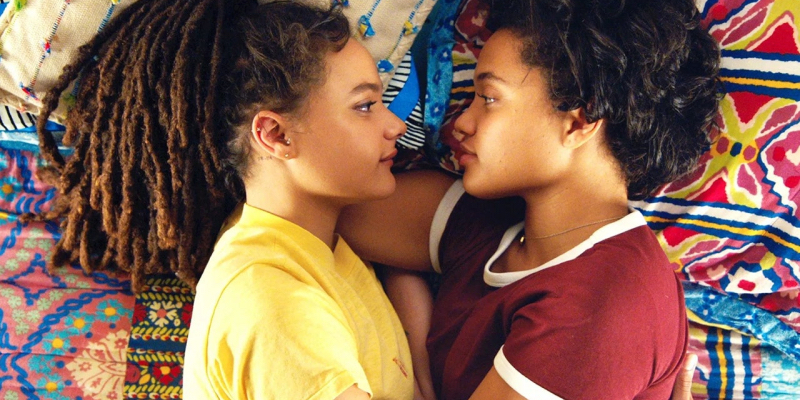
So many coming of age stories about black girls, and about lesbians, so especially about black lesbians, are rooted in trauma. What left me positively enamored about Hearts Beat Loud is that it’s bursting with love, support, and joy. Queer actress Kiersey Clemons lights up the screen as Sam, who’s tackling her last summer before leaving for college and her first real girlfriend, Rose (played by yet another queer actress, Sasha Lane). Their love isn’t marked by parents kicking anyone out of the house, or painful coming out stories. They’re just two weird teenagers who love indie rock music and each other. It’s refreshing, and sweet, and in my mind — a perfect love story, wrapped inside an otherwise imperfect indie film. – Carmen Phillips
41. Summertime (dir. Catherine Corsini, 2015)
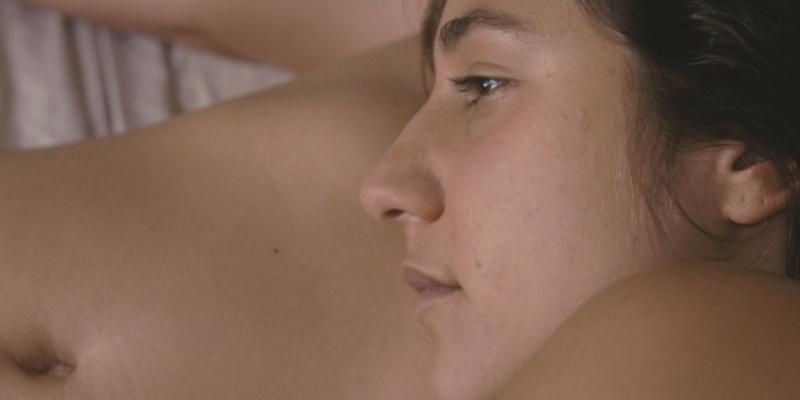
The first time I saw this movie I thought I’d seen a masterpiece. And then I was like wait a minute calm down you’re just horny. Izïa Higelin is one of the hottest people to ever people and watching her fall under the spell of Cécile de France’s confident teacher/activist obviously made me feel things. But maybe that’s enough to qualify it as a great movie! Am I parody of myself that I love the movie about French lesbians bonding over feminism? Yes. But it’s not like the movie isn’t also good in addition to being the best thing ever. It’s gorgeously made and well-acted and does a wonderful job capturing a moment in time and and and – okay fine just let me be horny. – Drew Gregory
40. Dope (dir. Rick Famuyiwa, 2015)
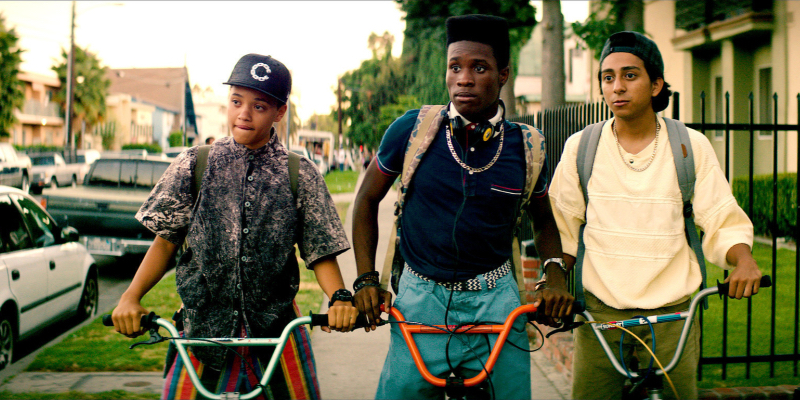
Dope is one of my all-time favorite movies, lesbian or otherwise. It’s one of the tightest scripts of the last decade. The teen heist comedy is unexpected and funny and surprisingly thrilling — which is a lot of compliments from me about a movie with a teenage boy as its protagonist! On top of all those delights, there’s teenage Kiersey Clemons as Diggy, the protagonist’s lesbian best friend. Even at her young age in the film, you can tell she’s already a natural on screen. She steals the camera’s focus without even trying. Also, it’s worth mentioning, the black masc lesbian costume styling in this film? Top notch. – Carmen Phillips
39. The Girl with the Dragon Tattoo (dir. David Fincher, 2011)
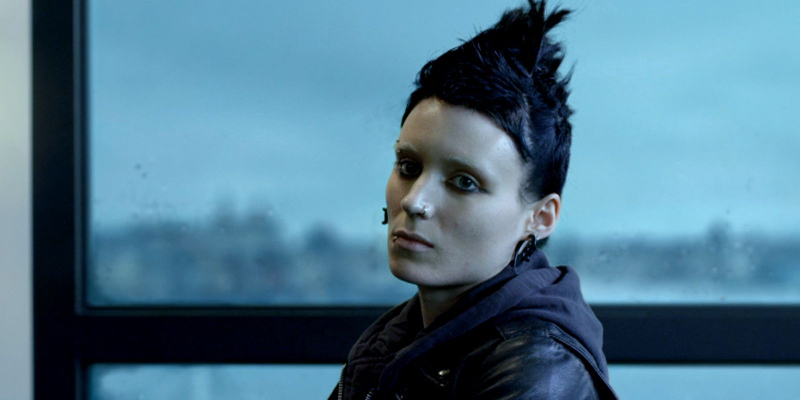
There have been other female action heroes — from Pam Grier’s Foxy Brown to Gal Gadot’s Wonder Woman — but few have captivated audiences quite like Lisbeth Salander. Starting with Stieg Larsson’s opening salvo in the Millenium series to the Swedish film to the 2011 David Fincher adaptation, I’m hard pressed to recall another female action hero that’s generated that much fervor on her own.
Stepping into Lisbeth Salander’s boots is an unenviable task but Rooney Mara rises to meet the challenge. She is astounding as the pierced, bisexual, tattooed hacker recruited by disgraced journalist Mikael Blomkvist (Daniel Craig) into investigating the Vanger family. Fincher’s decision to structure the film into five acts — rather than the usual three — requires Mara to carry more of the film’s load: balancing being the badass who fuels the movie’s action sequences and enigmatic enough to keep your attention during Dragon Tattoo‘s procedural parts. She earned every bit of that 2012 Oscar nomination. – Natalie
38. Eva + Candela (dir. Ruth Caudeli, 2018)
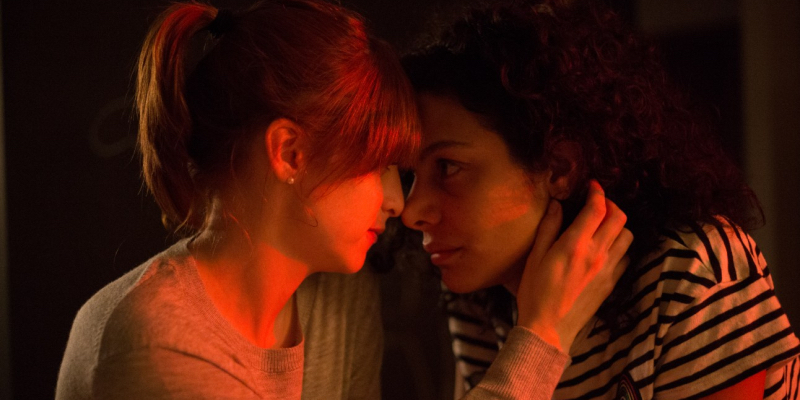
There certainly is no shortage of lesbian romances where things don’t work out – internalized homophobia, externalized oppression, sickness, murder, suicide. But bless Ruth Caudeli’s debut feature for showing our heartbreak the way it usually occurs in all its messy emotions. Most queer women don’t break up because of queerness. Most breakup because God fucking damnit sustaining a relationship – years with another person! years! – is very, very difficult. Silvia Varón and Alejandra Lara are incredible as Eva and Candela as we watch them fall in love and out of love and back in love and out of love, trying so hard to make things work, because they love each other. Truly, they do. It’s a relatable and painful movie that celebrates love in all its impossibilities. And it’s a delightful announcement of a new queer filmmaker who has decades of great films ahead of her. – Drew Gregory
37. Bit (dir. Brad Michael Elmore, 2019)
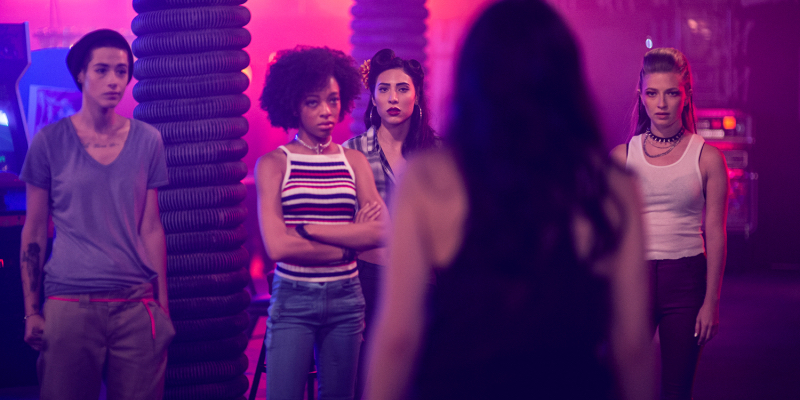
If you’re not a trans lesbian, like I myself am so lucky to be, you may not fully be able to grasp the rarity of this low-key vampire movie. There are only two trans women leads on this list and the other one ends up with a man. While the decade has shown incredible progress for cis lesbians, trans lesbians are still more or less non-existent on our screens. And yet, there is Bit, where Nicole Maines joins a group of lesbian separatist vampires! It’s fun, it’s sexy, and it’s made with a casual touch never weighed down by the uniqueness of its representation. It’s not a perfect movie, but I treasure its existence, and I hope it gets a proper release soon. I’ve never seen my romantic life on a movie screen. Not fully. But there’s a scene in Bit that comes the closest; that doesn’t require me to ignore my transness or my gayness. The only difference between this movie’s meetcute and my own is usually when I kiss someone it doesn’t end with them sinking their teeth into my neck. Usually. – Drew Gregory
36. Hooters! (dir. Anna Margarita Albelo, 2010)
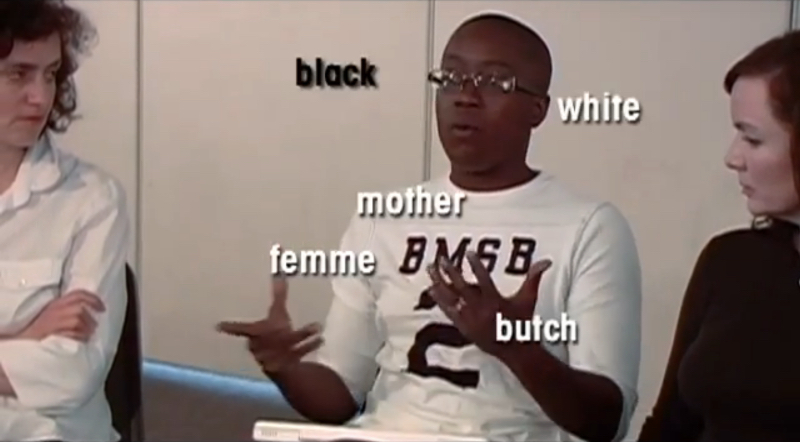
Part behind the scenes featurette, part treatise on the state of lesbian cinema, Anna Margarita Albelo’s making-of documentary about Cheryl Dunye’s The Owls is a remarkable work of art in its own right. With sharp interviews and cinema verité gold, Albelo captures a debate around how we present ourselves as a community. Generational divides abound in discussions of gender, sexuality, and filmmaking. Queer culture shifts so rapidly it’s a treat to have this document of a specific period of time.
After six years way from filmmaking, The Owls was a return for Dunye, an attempt to prove that independent lesbian cinema was still possible in a landscape increasingly focused on respectability. But it’s Albelo’s examination of the moment that proved this to be true. Her signature sense of humor and formal recklessness combined with insight from Dunye, Guinevere Turner, and a very young Rhys Ernst, make for the rare movie about movies that’s really about so much more. – Drew Gregory
35. Lyle (dir. Stewart Thorndike, 2014)
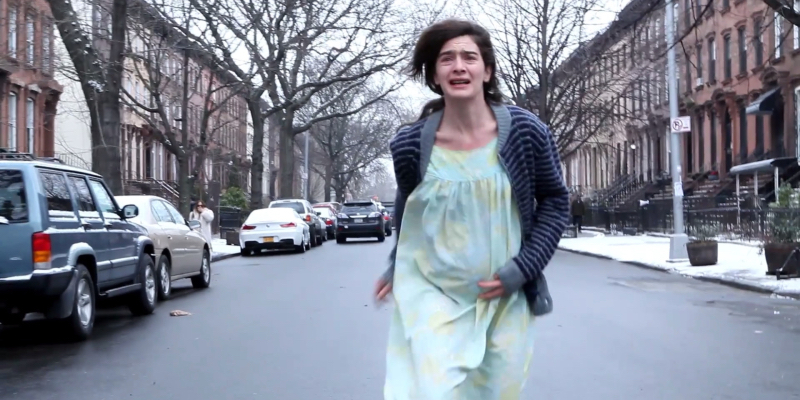
It’s unnecessary to say that Stewart Thorndike’s fierce horror movie is more than its pitch – what if Rosemary’s Baby was gay? It’s unnecessary, because the film doesn’t settle in that premise and it doesn’t go beyond it. Instead it dives deep into the thematic mess that question raises. I’m still not sure what the film is saying, and I’m not sure it’s really saying anything. It’s just asking questions we don’t ask; expressing feelings often left unexpressed. And as an experience it’s an absolute ride. It’s a truly horrifying movie with a desperate central performance from Gaby Hoffman and an ominous supporting performance from Thorndike’s ex Ingrid Jungermann. Stewart Thorndike discussed wanting to make a trilogy of horror movies and I am very upset that she hasn’t been given the money to do so! Somebody give Stewart Thorndike some money! It’s been five years and I want more work from her! Are you, dear reader, a film financier?? If so, give Stewart Thorndike money right this minute! – Drew Gregory
34. Codependent Lesbian Space Alien Seeks Same (dir. Madeleine Olnek, 2011)
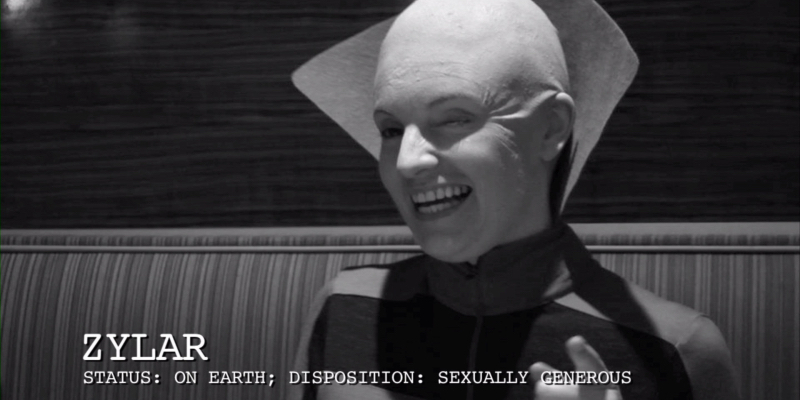
This bizarre and hilarious comedy is a tribute to lonely lesbians across the galaxy. Following the pursuits of three aliens sent to Earth to get their hearts broken so they’ll stop feeling so much, Codependent Lesbian Space Alien Seeks Same is painfully relatable even amidst all its silliness. The movie shows that there’s someone out there for every misfit – you may just have to journey to a new planet to find them. Most of the genre films on this list are not made by queer women, so it’s a delight that Olnek leaned into her budgetary restraints showing all you really need for sci-fi is commitment. And this sure does have commitment! – Drew Gregory
33. In Between (dir. Maysaloun Hamoud, 2016)
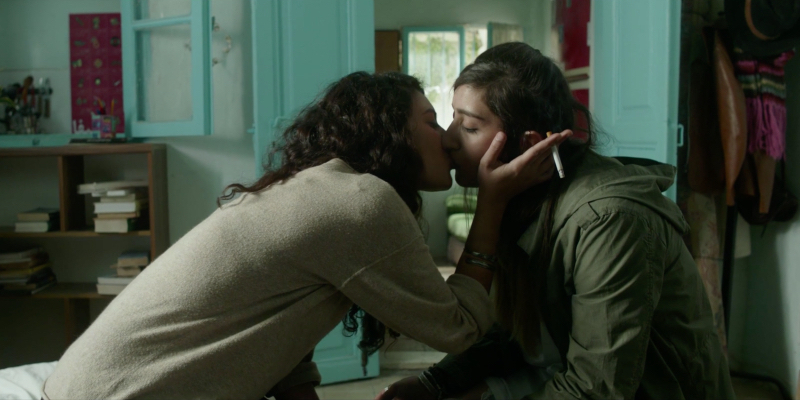
I love this movie with a specific passion even my excitable self rarely feels. There’s just something about its trio of stubborn women – Leila, Salma, and Nour – that feels so familiar to me, facets of my own personality, pieces of others I admire. It’s such a gift to spend time with these people watching them push against their oppression finding love and connection in partners, each other, themselves. The word feminism is thrown around a lot of in film criticism these days, but Hamoud’s film feels feminist in a pure and personal way I rarely see. This is a film about the occupation of Palestine, about patriarchy, about homophobia, and it is a film about surviving. That doesn’t mean simply living through the day – though sometimes that’s certainly all we can manage – but dancing and eating and fucking and loving. Tell the assholes to fuck off and look hot while doing it. Care for each other when it’s all too exhausting. I’m so grateful to Hamoud and the lead actresses – Mouna Hawa, Sana Jammelieh, and Shaden Kanboura – for making such a remarkable film that I’m certain will only grow in esteem in the decades to come. – Drew Gregory
32. Black Swan (dir. Darren Aronofsky, 2010)
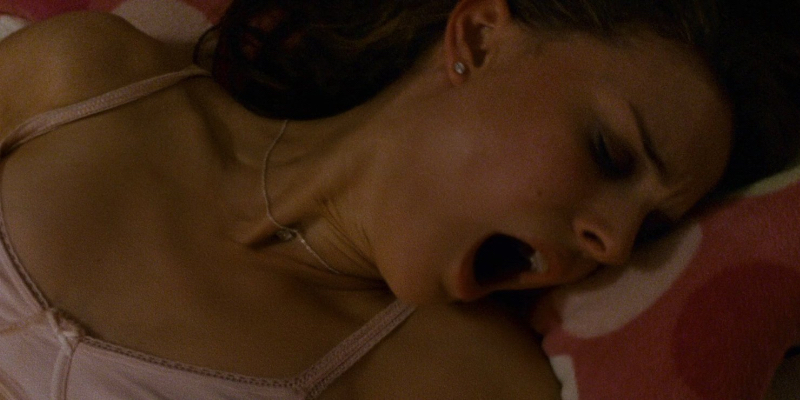
Frenetic yet vulnerable, sexy yet haunting, Black Swan is a nightmarish ballet of mommy issues, power struggles, and polarities. It’s the classical ballet Swan Lake — on poppers. Nina (Natalie Portman) and Lily (Mila Kunis) diverge in their approach to the artform: Nina is too technical and rigid for the likes of choreographer Thomas (Vincent Cassel), while Lily is an unpredictable firecracker. When Thomas intentionally shatters boundaries between the professional and the personal, Nina unravels, unsure of what’s real and what isn’t. Use of the fantastic in the movie is just right — sparse enough to shock but a consistent thread in the movie’s visual storytelling. Some of its more horror-leaning images are the kind that stay with you for years. – Kayla Kumari Upadhyaya
31. Thelma (dir. Joachim Trier, 2017)
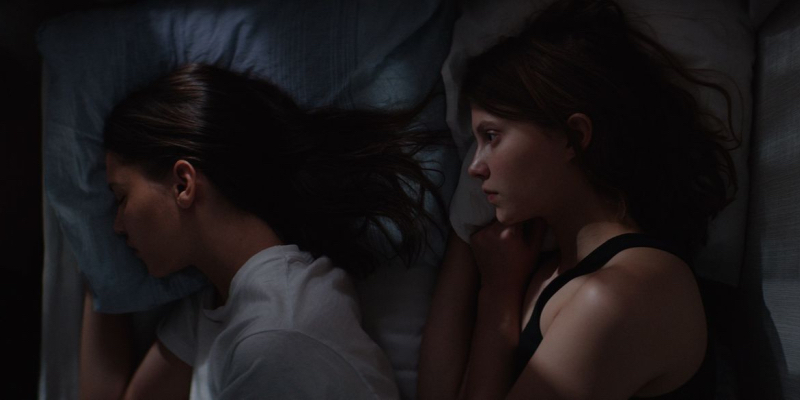
Thelma’s magic lives entirely in its camerawork and editing. Mesmerizing visuals make up for the wobbly plotting and provide a clear throughline. Thelma wraps an X-Men-like narrative in avant-garde horror dressings, and the result is quite lovely. Raised by oppressive, strictly Christian parents, Thelma’s first taste of kindness and acceptance comes from her fellow classmate Anja, whose affection sets off a sexual awakening for Thelma. Her burgeoning supernatural abilities reflect her trauma but also her strength, and there are touches of Carrie throughout the Norwegian-language film. It’s a slow-burn horror about desire and control, and it ends on a very dark, twisty note. – Kayla Kumari Upadhyaya
30. Boy Meets Girl (dir. Eric Schaeffer, 2014)
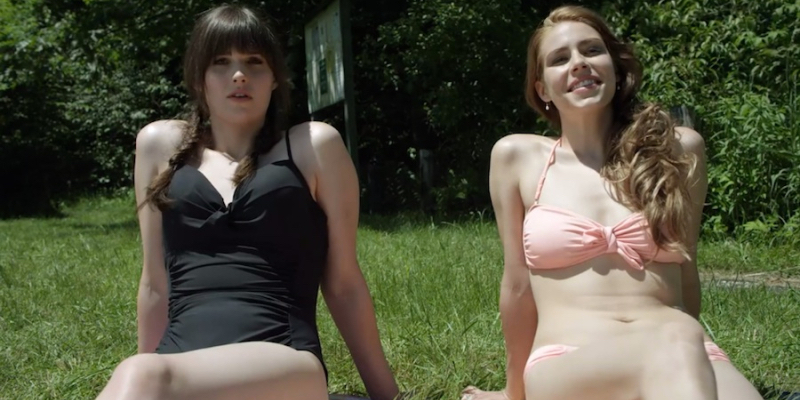
People ask me about dating as a trans woman with a grimace on their face. Their tone – or, on occasion, their words – suggest I might always be alone. This is absurd, of course. Trans women have been desired and loved since we’ve existed which is forever. But it’s true that there are minimal examples of this in media. Looking at the landscape of trans representation – especially in 2014 when Boy Meets Girl came out – one might think we can only be sexless or sex objects.
This is all to say – the saccharine romance of Boy Meets Girl is a fucking gift. I love the messy love quadrangle Ricky gets herself into and I love that it all gets wrapped up in a nice bow. I don’t even mind that she ends up with the boy! Well, I don’t mind it much at least. We still get a sex scene – A SEX SCENE – between Ricky and Francesca that’s sweet and silly and really, really hot. But beyond representation, the movie works as well as it does because Michelle Hendley is an incredible actor. She is a full-on movie star in appearance and charm and endless talent. Considering the number of cis queer women filmmakers who have made work this decade, it’s just a bit disappointing that the only trans women leads on this list were brought to us by two cis straight men. Cast a trans woman in your semi-autobiographical cliché lesbian romcom! I promise you a hungry and grateful audience. – Drew Gregory
29. Signature Move (dir. Jennifer Reeder, 2017)
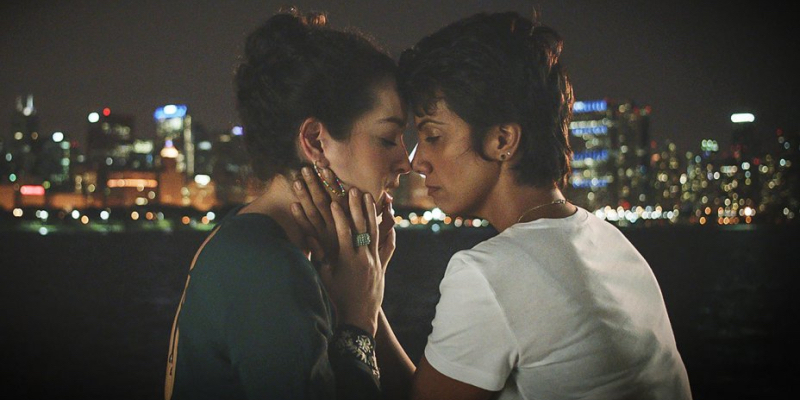
Zaynab, a 30-something Pakistani Muslim lesbian from Chicago who’s been living with and taking care of her recently widowed mother, finds herself falling quickly and unexpectedly in love with Alma — the Chicana bookshop owner whom she meets one night at a bar. Of course, Zaynab’s mother doesn’t even know she’s gay, and Alma has little interest in dating someone in the closet, so complications arise almost right away. There’s a lot about this movie that sounds predictable when you write it down, but on film it’s captivating. A lot of that has to do with not only the cultural authenticity and attention to detail, but also Zaynab’s personal obsession with Lucha-Style Mexican wrestling. I promise you’ve seen nothing like it. (Oh by the way, it was made by lesbian Pakistani filmmaker Fawzia Mirza, so when I say that authenticity and unexpected voice is at the core of this film, I absolutely really mean it.) – Carmen Phillips
28. Daddy Issues (dir. Amara Cash, 2018)

There is an unlikely love triangle at the center of Amara Cash’s debut – a young artist, her influencer crush, and the influencer’s drug-addicted sugar daddy. But that’s only the beginning. This is a bonkers movie filled with bright colors, pop montages, and ever-heightening emotion. It also happens to be one of the most adorable movies on this list. That’s right, amidst all the insanity, and all the sex, is the story of a young woman trying to find herself amidst first love. Sweet doesn’t have to mean safe. Sweet doesn’t have to mean respectable. Straight people don’t get to determine how we tell our stories and it’s a pleasure to watch Cash’s declaration of this fact. A first kiss can be magical. But so can a first fingering. – Drew Gregory
27. A Date for Mad Mary (dir. Darren Thornton, 2016)
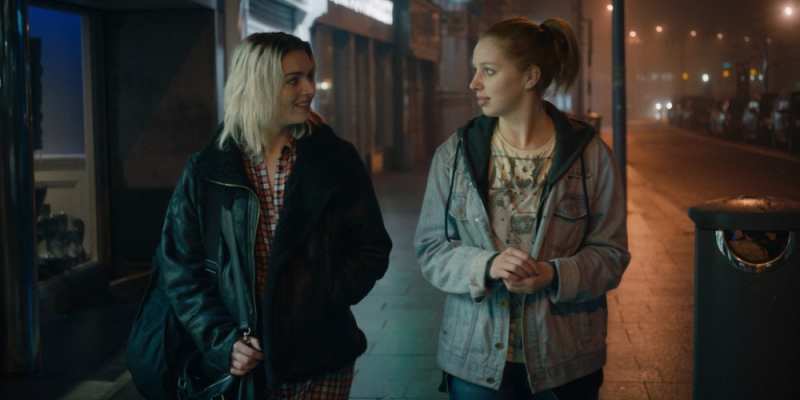
If you combined all my adolescent crushes into two people it would be A Date for Mad Mary romantic leads Seána Kerslake and Tara Lee. But that’s not the only reason I love this Irish romantic dramedy. I love this movie for its heart and its humor and its totally fresh take on the in love with your straight best friend trope. Kerslake’s titular character has no idea she’s in love or that she’s even queer. She just thinks she’s frustrated with her soon-to-be-married friend Charlene for being so absent, especially when Mary just spent months in prison. The fact is Mary doesn’t know who she is. She doesn’t know why she’s so angry, why she keeps fucking up and hurting people, and why she can’t find a date to this wedding. It doesn’t all come back to her queerness – but a lot of it does.
Enter videographer/singer Jess. The chemistry is immediate and even if she’s not sure why, Mary just really likes being around her. Unfortunately, Mary keeps going back to Charlene. Mary’s growth throughout the movie is strained and troubled, but Kerslake finds nuance in every moment. Mary becomes an easy character to root for even if you aren’t painfully attracted to her – which, again, to clarify, I am. – Drew Gregory
26. Shakedown (dir. Leilah Weinraub, 2018)
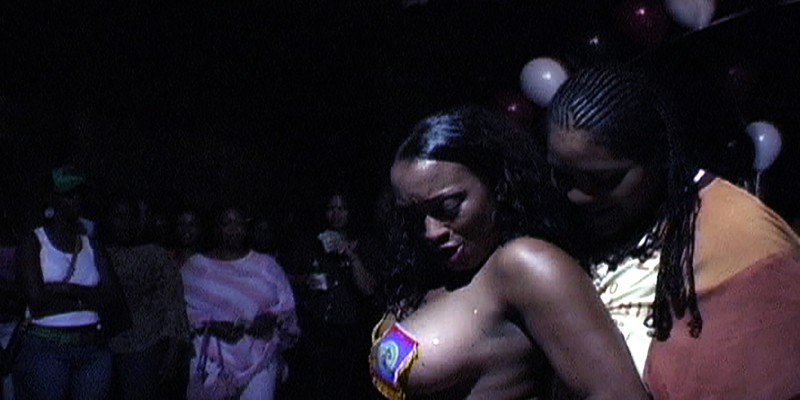
Shakedown is a documentary exploring early-aughts Los Angeles via the lens of the underground black lesbian strip club from which the film gets it name. For a documentary, which is a genre most often associated with dry facts on screen, it’s also deceptively seductive — playing with the same pulls of fantasy that dancers are also selling to their customers. It’s so incredibly sexy and you can’t take your eyes off the line up of both femme and stud performers on stage (or their lives behind the scenes once the music stops playing.) – Carmen Phillips
25. Bessie (dir. Dee Rees, 2015)
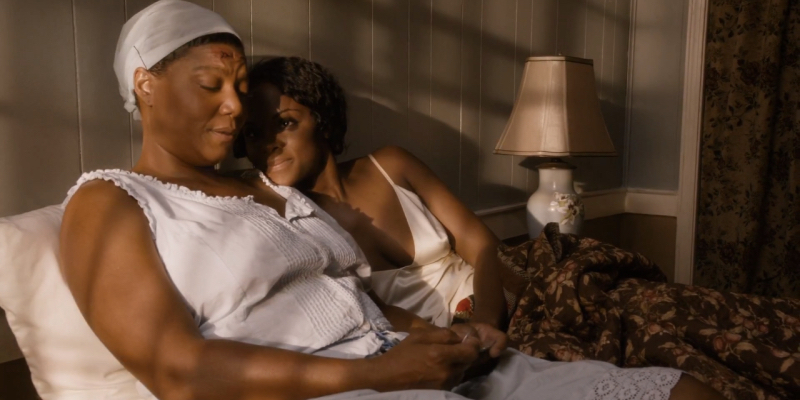
In 2002, Queen Latifah scored her first Oscar nomination for her turn as Matron “Mama” Morton in the film adaption of Chicago. For someone who had, until then, built a career primarily on sitcoms and an eponymous talk show, the Supporting Actress nod highlighted that Latifah was capable of so much more. In the years since few movies have given Latifah the opportunity to earn that critical acclaim but Bessie did. Latifah embodies blues legend, Bessie Smith, in some of the best work of her career…and for it, she earned an Emmy nomination (Best Actress in a TV Movie) and her first Emmy win (Best TV Movie).
Bessie is rare in its depiction of sexuality: showcasing both Bessie Smith’s bisexuality and polyamory and Ma Rainey’s (played by a scene stealing Mo’Nique) unapologetic lesbianism. – Natalie
24. Valencia (dir. various, 2013)
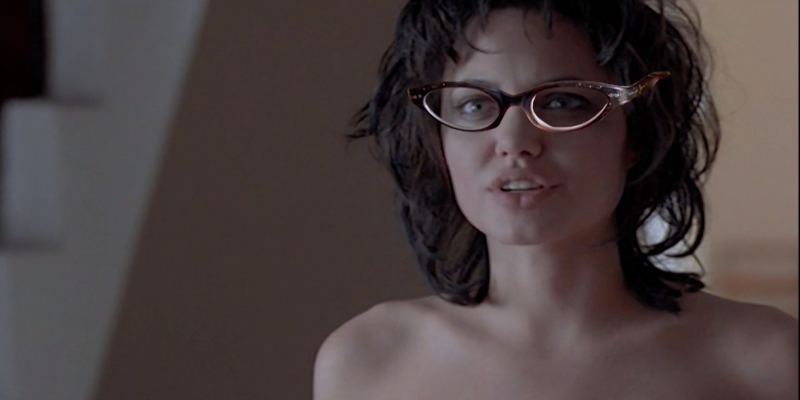
Billed as a “collaboration between a national community of queer filmmakers” this omnibus adaptation of Michelle Tea’s novel is one of the queerest, transest movies you’ll ever see. Produced by Clement Hil Goldberg and including directors such as Cheryl Dunye, Jill Soloway, and Silas Howard, this movie is the cinematic equivalent of a co-op. Every take on Tea’s work is so different, yet the sections complement each other so well. “Michelle” is played by a variety of cis women, a trans woman, a trans man, an animated character, and even Angelina Jolie in Gia but with Tea’s signature glasses superimposed. There’s a reckless freedom – a fluidity to gender and sexuality and art – that makes this a landmark work of queer cinema. — Drew Gregory
23. Disobedience (dir. Sebastián Lelio, 2017)
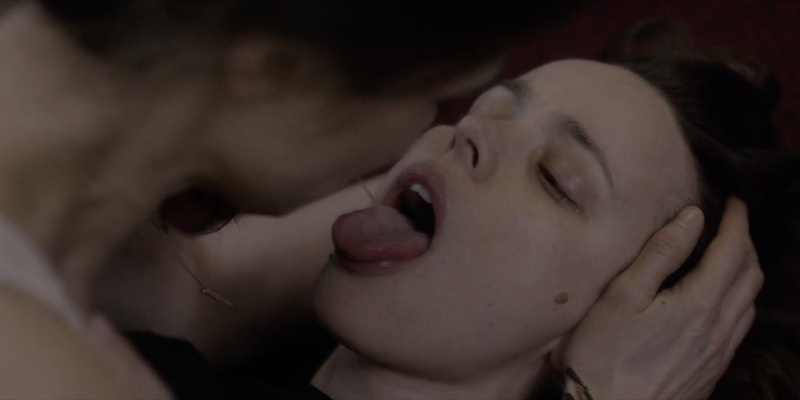
A quiet contemplation of faith, desire, and community, Disobedience looks at the disparate ways childhood lovers Esti (Rachel McAdams) and Ronit (Rachel Weisz) contend with the expectations forced on them in their Orthodox Jewish upbringing. Ronit left, and Esti stayed, and when a funeral brings Ronit home, she’s forced to face the ways she hurt those she left behind and grapple with why Esti remains. The reunion of two lovers sparks scintillating chemistry that is full of familiarity and a long history of emotions. Yes, the spitplay is hot, but the specific way it happens indicates that this is far from the first time it has happened, which makes it all the hotter. – Kayla Kumari Upadhyaya
22. Circumstance (dir. Maryam Keshavarz, 2011)
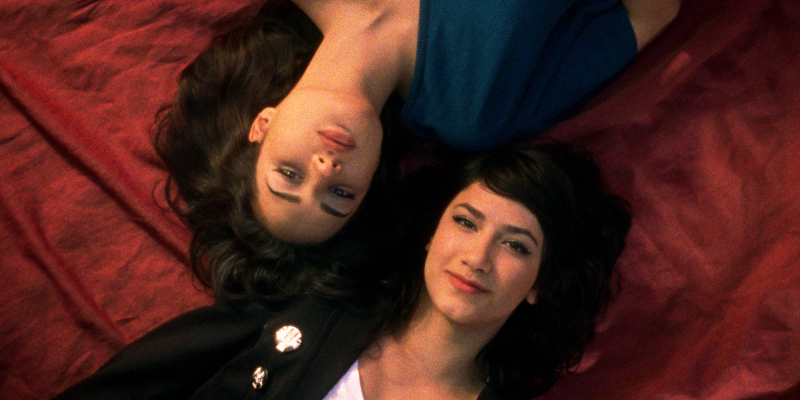
By the time I watched Nikohl Boosheri’s breakout role, I’d already fallen in love with her twice. First, in Meera Menon’s Farah Goes Bang where she plays a woman trying to lose her virginity on the John Kerry campaign trail, and then on the first season of The Bold Type where she plays the devastating Adena El-Amin who yanks Kat Edison out of the closet. There’s something about the easeful way Boosheri can alternate between seductive seriousness and goofy charm that is frankly cruel when paired with her physical beauty. Woah. Okay. I really must apologize to Maryam Keshavarz for getting too distracted by my horniness to give this legitimately masterful work of cinema its proper praise. But you know what? I don’t think she’d mind. Because one of the reasons Circumstance is so great is that even though it’s telling the harrowing story of homophobic oppression in contemporary Iran it never shies away from being sexy. The contrast Keshavarz is drawing between her characters’ private life and public life – the life they want versus the life they’re forced into – is emphasized by sex. It’s important we feel their intense want for each other, so it’s not merely theoretical when it’s taken away. Boosheri and her co-star Sarah Kazemy are so incredible and so beautiful and so electric together, it’s painful to watch them pulled apart. But more importantly does anyone know if Nikohl Boosheri is queer IRL and interested in dating a trans writer with curly hair and an encyclopedic knowledge of film? Asking for a friend. – Drew Gregory
21. Mosquita y Mari (dir. Aurora Guerrero, 2012)
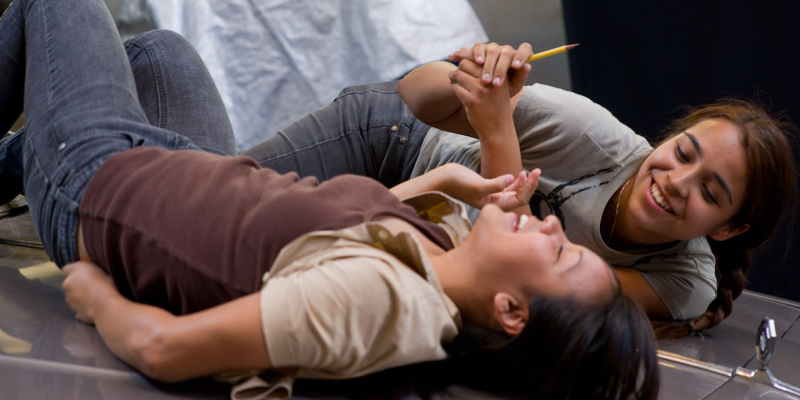
Mosquita y Mari is such a sweet retelling of kind of the romantic friendships that any nerd who’s ever had intense feelings towards “the bad girl” at school that you couldn’t quite explain, but consumed you nonetheless, will instantly relate to. Two Chicana high schoolers, Mari (Venecia Troncoso) and Yolanda (Fenessa Pineda), form a bond that’s more than friendship, but also stretches beyond the vocabulary they have at the moment for girlfriends or queerness. What makes Mosquita y Mari stand out is not only how authentic it is to Latinx and Chicanx families and coming of age (though that is a big part of it) — but also how the film finds a way to explore a queer teen romance that’s slippery and ambiguous. Not all of us come out clearly or in a “straight” line, Mosquita y Mari captures that experience like few others can.– Carmen Phillips
20. Blockers (dir. Kay Cannon, 2018)
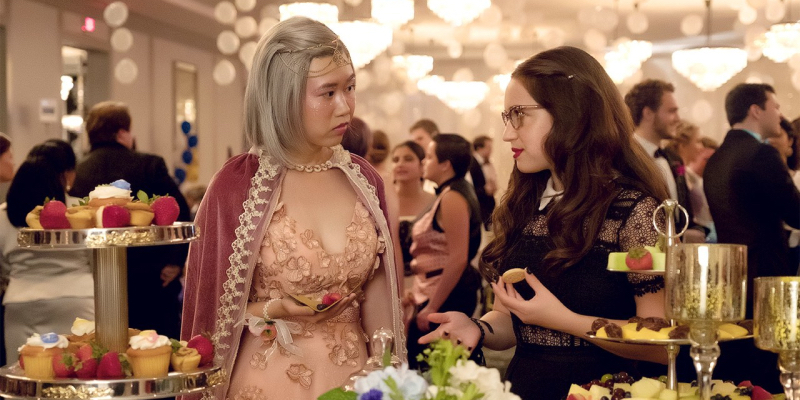
Blockers is a prime example of a movie harmed by the initial reactions to its promos, which made it seem like a sex-negative comedy about parents attempting to make sure their teen girls never have sex, when in reality, the film is the ideological opposite of that. Yes, these parents are overbearing, but the movie is critical of that, creating complex, convincing arcs for each of the parents as well as the teens. Its coming-out story is cute and grounded, featuring a very sweet father-daughter scene, supportive friends, and nerdy romance. The whole cast is great down to the tertiary characters. – Kayla Kumari Upadhyaya
19. A Simple Favor (dir. Paul Feig, 2018)
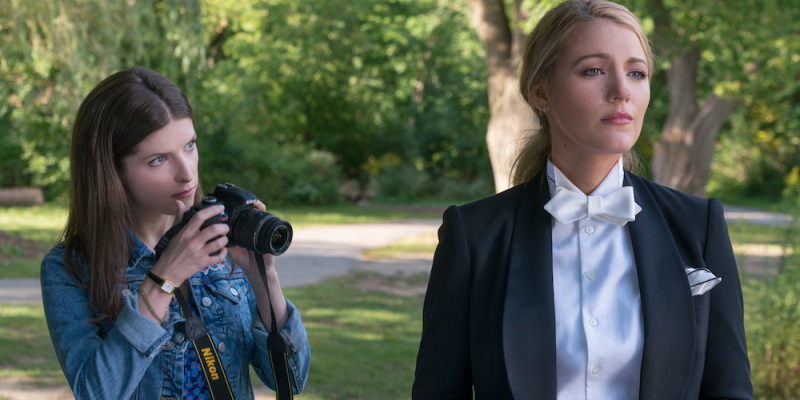
I saw this movie late and was so sure it had been hyped up by my friends to be gayer than it actually was so I was absolutely delighted to learn that it’s actually quite gay and not just in a “Blake Lively in a tux reminded me what being gay is all about” way. It of course was extreme and campy and truly wild but it was kind of the perfect metaphor for that feeling you get when you’re first realizing you’re into girls but can’t tell if you want to be her or date her or both and your brain is in an action movie while your heart is in a romance and you forget which way is up. – Valerie Anne
18. Booksmart (dir. Olivia Wilde, 2019)
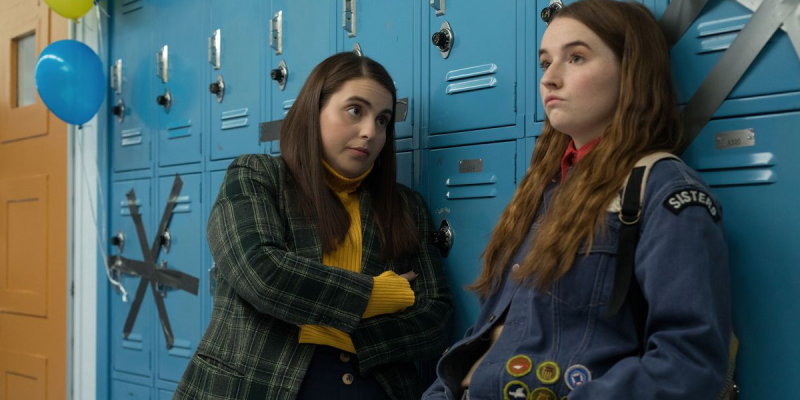
Booksmart is the buddy comedy I never knew I always wanted. Two teenage girls who love each other and are weird and goofy and smart and who aren’t fighting over boys or an mis-overheard sentence or a rumor. It was fun and funny and emotional and gay in that real, awkward, funny way that gayness sometimes is. I don’t remember the last time a movie made me laugh that hard for that long, and it’s always refreshing to watch female friendships that are so obviously and refreshingly written by women. – Valerie Anne
17. Rafiki (dir. Wanuri Kahiu, 2018)
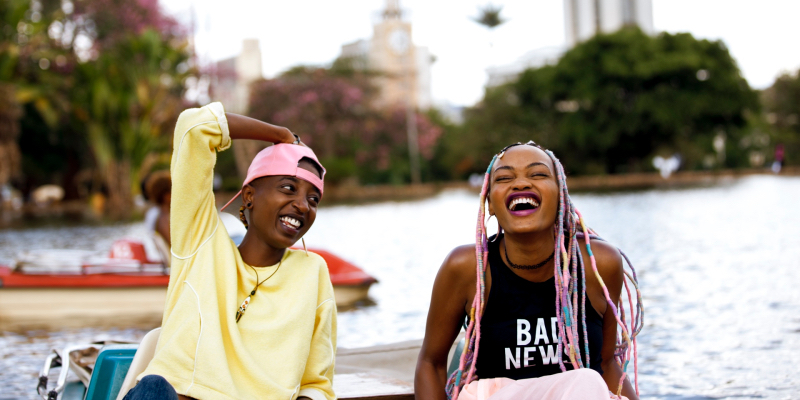
In her 2017 TED talk, Rafiki‘s future director, Wanuri Kahiu, ushered in a new genre of African filmmaking called “AfroBubbleGum.” She had grown tired of African films that dealt with the war, poverty, devastation and AIDS; instead, she wanted to “curate, commission and create art that celebrates fun, fierce and frivolous Africa.” A year later, her film Rafiki — the incredible adventure of two Kenya girls in love, if you will — became the first Kenyan film to screen at the Cannes Film Festival.
Even as the film grapples with Kenya’s homophobia, both on-screen and off, Rafiki fulfills Kahiu’s promise. AfroBubbleGum seeps out through the film’s use of bold color — watch the progression of pink! — and a vibrant soundtrack. But Rafiki‘s ultimate strength lies in its stars, Samantha Mugatsia and Sheila Munyiva, who are magnetic as Kena and Ziki. – Natalie
16. Suicide Kale (dir. Carly Usdin, 2016)
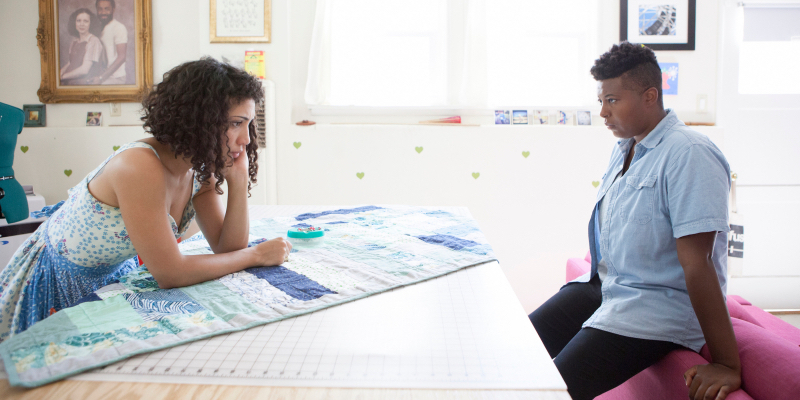
A dark comedy filmed in natural light, Suicide Kale is queer in its marrow, centered on two queer couples at different stages in their relationships and made by a team of queer creatives (Brittani Nichols penned the very funny, natural script, and Carly Usdin directs). It takes place over the course of just one home meal, but the suicide note its title references unearths relationship drama, tension, and complicated emotions that give way to a larger story about intimacy and trust. It feels special from start to finish. – Kayla Kumari Upadhyaya
15. Princess Cyd (dir. Stephen Cone, 2017)
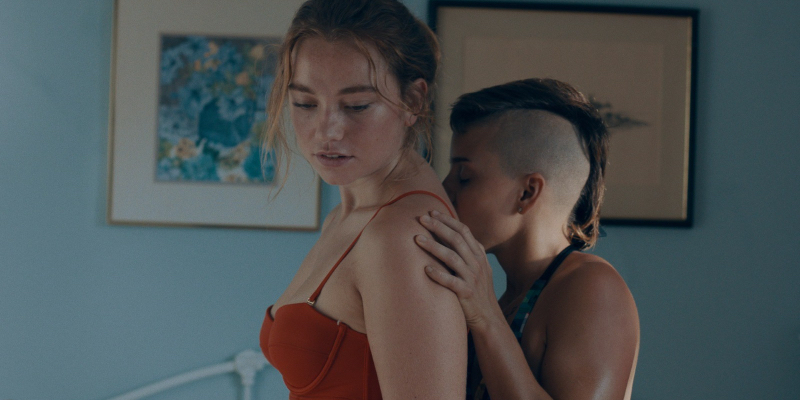
The first time I watched Princess Cyd I watched it again a few hours later. My girlfriend at the time got home from work and I was bursting with a certain chaotic enthusiasm anyone who knows me knows too well. I insisted it would just be easier to show her than try and articulate why I’d fallen so deeply and completely in love with this movie. So we watched it! And she understood! How could she not? Because Princess Cyd is so, so good.
The mostly non-existent plot is Cyd decides to spend a summer with her novelist aunt Miranda. As she explores her casually pansexual desires – most significantly with hottie barista Katie – she also reflects on the memory of her mother and learns to respect Miranda’s less sexual approach to life. The experience of watching the movie is like being invited to one of Miranda’s living room readings. The experience of watching the movie is like being a part of one of Cyd’s trysts. The experience of watching the movie is like remembering the best summer of your life that you didn’t even realize was the best summer of your life until years later you think back on a small moment that shouldn’t mean much and realize it means everything. Every time I open Netflix I hover the cursor over Princess Cyd tempted to sink back into its world. After texting one friend about this movie for the millionth time she said: “I feel like instead of an eternal flame at your grave should just be a speaker of your voice wailing PRINCESS CYD IS SO GOOOOOD on repeat. Forever.” Add it to my will. – Drew Gregory
14. The Favourite (dir. Yorgos Lanthimos, 2018)
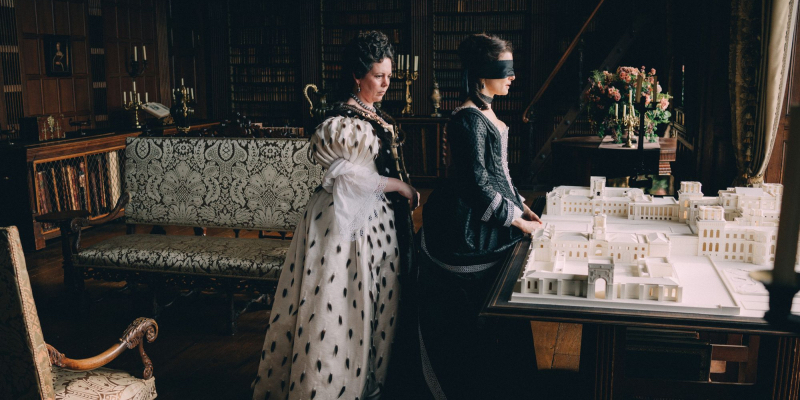
After I saw The Favourite for the first time, I spent the next 24 hours asking myself what in the world I’d watched. I don’t just mean director Yorgos Lanthimos’ surreality and fishbowl lenses that have been discussed at length by straight critics everywhere for the last two years. I mean also, “Did I just witness both Rachel Wesiz and Emma Stone fingerbang the Queen of England?” (Yes, and not even, in my opinion, in their best ever gay roles.) The other thing that really sets this period piece apart is how damn messy all three of its leads are. Lady Churchhill, Abigail, and The Queen herself. But even their nastiest actions are clearly motivated by a desperation to survive in a world that would otherwise strip them of all agency and leave them powerless and penniless. Lanthimos resists the seemingly collective urge of all male writers and directors to justify any of of his female characters’ worst behavior, or to punish them for it. No one even gets assaulted. He showcases the full humanity of three entire queer women who fuck and fuck over each other, and aren’t sorry about it. It seems so simple, yet remains revolutionary. – Heather Hogan
13. Mommy is Coming (dir. Cheryl Dunye, 2012)
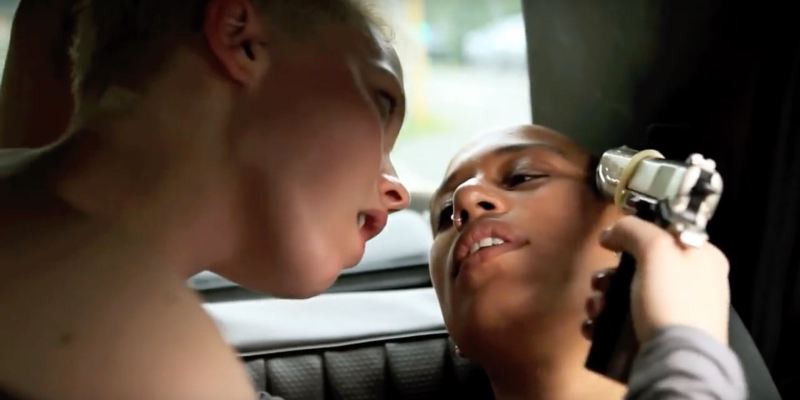
Dubbed the most heterophobic movie of all time by, well, me — Cheryl Dunye’s most recent feature film is a farcical odyssey through contemporary Berlin. With an irreverent sense of humor and committed sense of place, Dunye’s film (co-written with Sarah Schulman) is a sexy and silly good time. It’s a celebration of queer sex in all its forms and a thrilling reminder of Dunye’s importance to queer cinema and cinema in general. It begins with a condom covered gun, ends with some accidental incest, and stops at a sex club along the way. Mommy is Coming is a declaration that queer cinema doesn’t have to assimilate. There’s still a need for work that’s bold and reckless and made just for us. – Drew Gregory
12. The Daughters of Fire (dir. Albertina Carri, 2018)
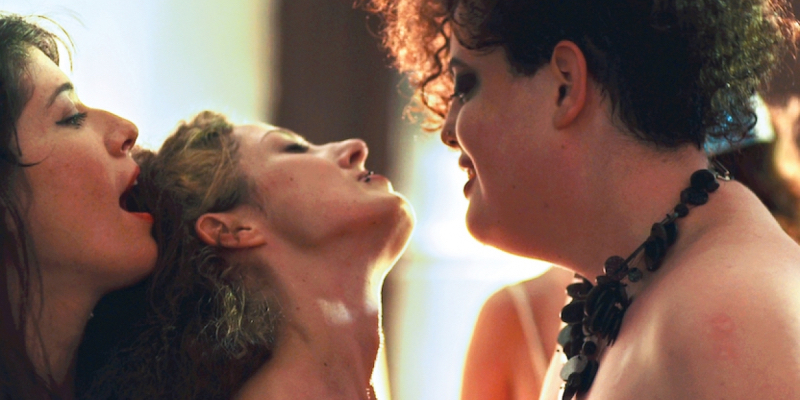
This exploration of the possibilities of pornography answers its own question. Can porn be truly feminist and truly queer? Yes, of course, and this movie is proof. Mostly plotless, this road movie through Argentina follows a lesbian couple as they add more and more queers to their traveling gang of lovers and friends. The cinematography is gorgeous. The narration is poetic. The sex is real and kinky and inclusive. It can be watched in a theatre as a work of art and it can be watched at home to get you off. It’s a treat to live in its utopic vision of queer community and pure desire. – Drew Gregory
11. Second Star on the Right (dir. Ruth Caudeli, 2019)
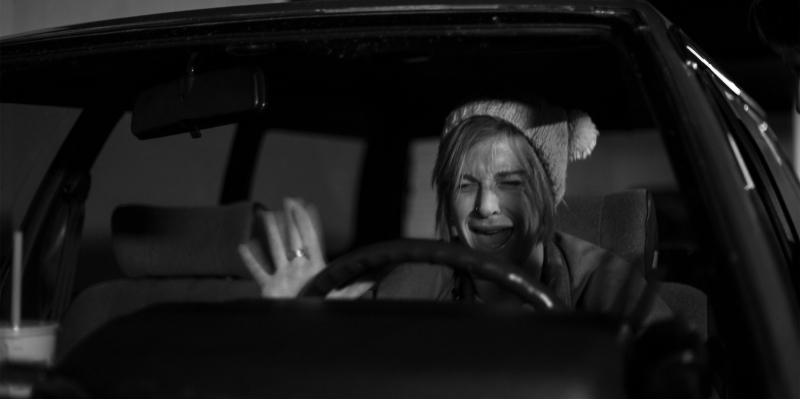
If Ruth Caudeli’s debut Eva + Candela (#38!) showed the promise of a great new filmmaker, her second film – a mere one year later – has the confidence of an artist fully formed. This story of an immature bisexual surrounded by rapidly maturing straight friends is bursting with formal experimentation. There is so much queer creativity in every frame illuminating Emilia’s inner life and various struggles. The black and white cinematography is subtly crafted and the moments of color are magnetic. Silvia Varón – Caudeli’s muse and, based on Instagram, IRL girlfriend – is so fucking good as Emilia. She’s hilarious and painful and always manages to keep us on her side. This is a messy movie in character and plot and style, but I say that as a compliment. Caudeli commits to the mess of her heroine and respects the messes we all sometimes make of our silly queer lives. – Drew Gregory
10. The Miseducation of Cameron Post (dir. Desiree Akhavan, 2018)
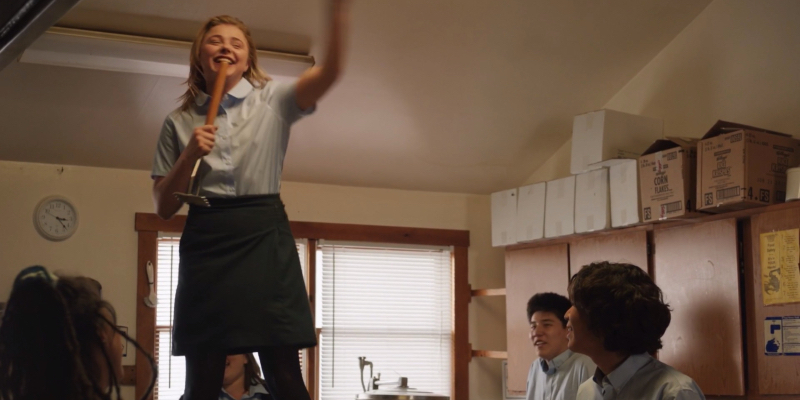
Instead of simply filming Emily M. Danforth’s sprawling novel, Desiree Akhavan created a true adaptation – focusing on the second half, changing the ending, still capturing its essence. Like its source material, Akahavan’s film uses the story of a teen girl’s time at conversion therapy as a larger exploration of the way queer people are brainwashed to doubt our feelings. The headstrong Cameron – an incredibly dykey and just plain incredible performance from Chloë Grace Moretz – is a perfect protagonist as we watch her slowly start to lose a grasp on her reality. Aided by Ashley Connor’s cinematography and Julian Wass’ score, Akhavan’s film is a truly cinematic experience, never afraid to let a moment or an image sit. The sex scenes are long and specific, reminding an audience just how different it is to watch a queer woman coming-of-age movie made by an actual queer woman.
Also the movie is really funny! Is it a serious drama about queer self-hatred? Yes. Does it still have Akhavan’s biting sense of humor? Also, yes. It’s not maudlin. It shows how queer people, even in our lowest moments, find community and joy, make jokes about our oppressors, and keep on going to live another day. – Drew Gregory
9. Good Manners (dir. Juliana Rojas, Marco Dutra, 2017)
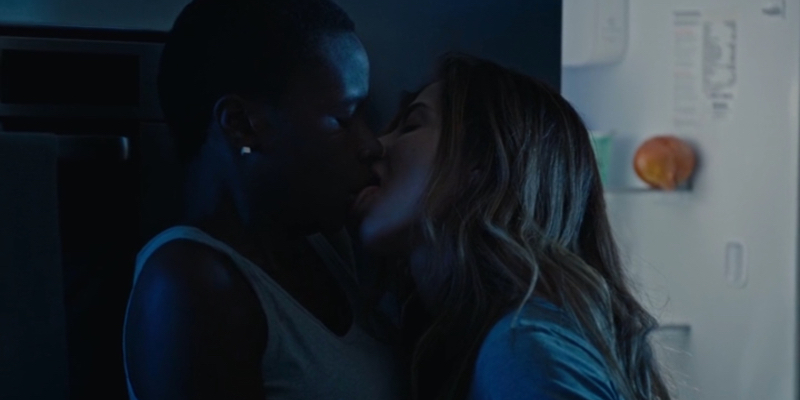
Horror-camp and relationship drama collide in this Brazilian movie that takes its sweet, sweet time building its world and mythology. But that character development and languidity is a welcome change of pace and stakes for what is ultimately a monster movie. Good Manners suffuses that genre with feelings as well as commentary on class, motherhood, and queerness. Isabél Zuaa’s quiet but memorable performance as Clara, a nanny for a rich and famous pregnant woman who she starts a relationship with, is the movie’s backbone, but Good Manners also manages to tackle a lot at once, including a coming-of-age story for its young boy Joel. It’s more complex than the average monster movie, but it also hits all the right notes of the genre with gore and frights. – Kayla Kumari Upadhyaya
8. Certain Women (dir. Kelly Reichardt, 2016)
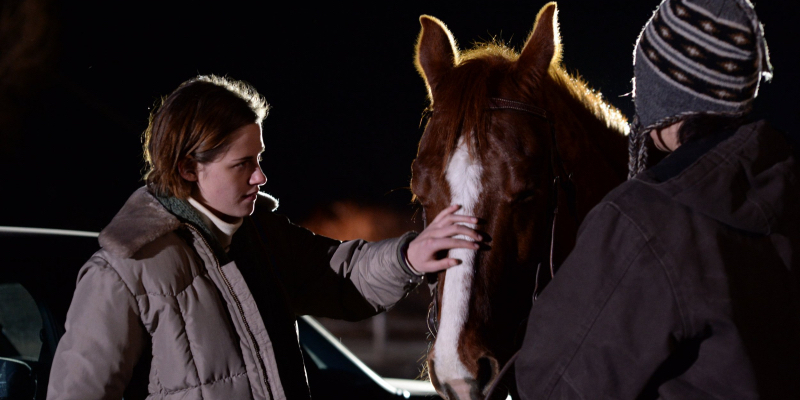
Based on three short stories by Maile Meloy, my favorite of Kelly Reichardt’s many quiet American masterpieces is a tribute to stubborn women. The sections starring Michelle Williams and Laura Dern are heartbreaking and beautiful, but it’s the third section starring Kristen Stewart and newcomer Lily Gladstone that makes me want to scream or crawl within myself and implode. Gladstone plays Jamie, a ranch hand who stumbles upon the law class being taught by Stewart’s Beth. Despite having no interest in law, Jamie keeps returning to this twice a week class to spend time with Beth. It’s less a romance and more a crush. It’s a less a crush and more a window into possibility. Jamie is living an isolated life where she’s surrounded by more animals than people. And the people she does interact with are certainly not queer – and certainly not Kristen Stewart. Of the three women in this movie Jamie is the least outwardly confident. In fact, she’s rather timid. But there’s something about Beth that drives her out of herself and pushes her to take risks and it’s thrilling to witness. This is a melancholy film, but it’s also a celebration of our tiny triumphs, our attempts at something more. – Drew Gregory
7. Dirty Computer (dir. Janelle Monáe and others, 2018)
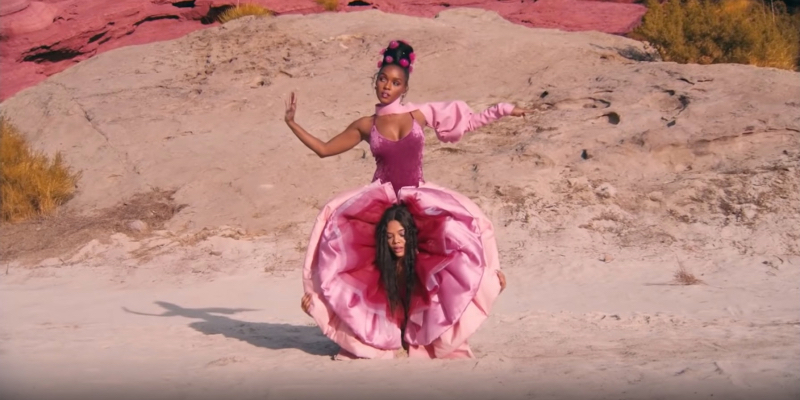
Janelle Monáe has always integrated science-fiction into the stories she tells in her music — dating back to the release of Metropolis: The Chase Suite, released in 2007 — but with the release of Dirty Computer, she took things to a whole new level. With her “emotion picture,” Monáe created a visual compliment to her GRAMMY nominated album, that was a part Westworld, part Eternal Sunshine of the Spotless Mind, part The Handmaid’s Tale and part THX 1138.
But the veneer between science fiction and reality has never felt thinner. In the world Jane 57821 roams and the one where Janelle Monáe lives as a queer black woman, there is a concerted efforts to erase the things that make us “dirty.” Dirty Computer is a call to resist the cleanse and to fight to be “free-ass motherfuckers.” – Natalie
6. Carol (dir. Todd Haynes, 2015)
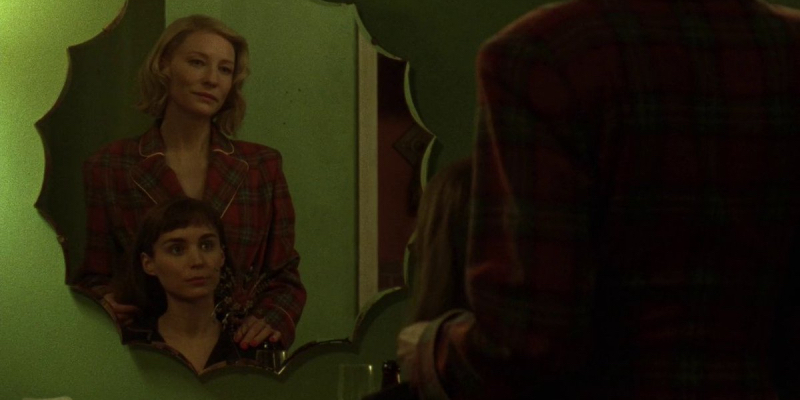
We’ve written more about Carol than any movie ever, and I’d venture to say that the internet at large has written more about Carol than any other lesbian movie ever — yet, somehow, I still cannot believe it exists. You can (and plenty of people do) disagree with me, of course, but I think it’s perfect. I think it’s a perfect film. Here’s a thing a lot of people don’t know: There’s a scene in the script in act one where Therese gives Richard a handjob. Director Todd Haynes did film it, but decided to cut it in editing — because he didn’t want the pleasure of a man to be the center of any experience Therese or Carol have in the movie. And that’s the real delight of the entire thing for me. Yes, it’s a brilliantly filmed and acted story about embracing who you are and the danger and ecstasy of giving into queer desire, but it’s also a story that relentlessly, mercilessly shoves men out of the frame. It invites the audience not to ignore them, but to laugh at them. At the end of the day, that’s why Carol didn’t win any Oscars. “Do you miss Richard?” Carol asks. Therese almost giggles. “…no. I haven’t thought about him all day.” – Heather Hogan
5. Professor Marston and the Wonder Women (dir. Angela Robinson, 2017)
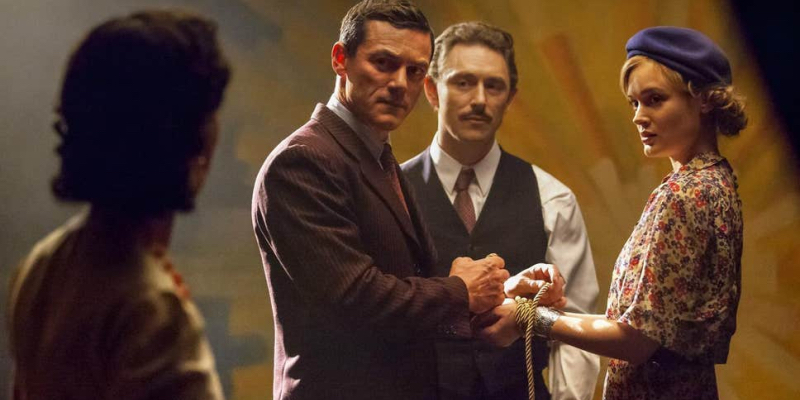
This movie is one of the most stunning movies I’ve ever seen. It’s a celebration of women and breaking the mold and daring to love. It’s heartbreaking and heartwarming and a true celebration of the love between three people in a casual and understanding way. I had heard that Professor Marston was in a polyamorous relationship with the women who inspired the comic but I’ll be honest, I thought the movie would maybe hint at it or mention it in passing; instead, it was the entire heart of the movie. It was dramatic and artistic and smart and also I learned things about science AND about Wonder Woman which really is my nerdy dream come true. I cannot recommend this unexpectedly unabashedly queer movie enough. – Valerie Anne
4. Portrait of a Lady on Fire (dir. Céline Sciamma, 2019)
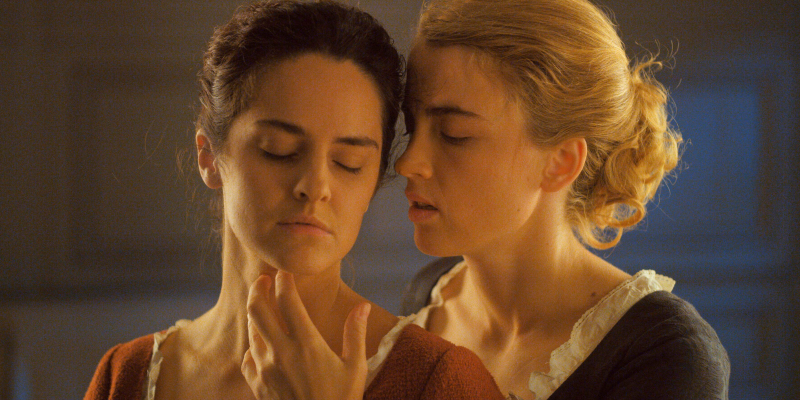
Before I came out, my lesbian viewing was restricted to films I could reasonably watch under the guise of cinephilia. It’s how you end up a scholar of queer film history before ever seeing an episode of The L Word. When Céline Sciamma’s debut film Water Lilies was released I wasn’t sure which category it fell into. The trailer was so completely gay – teenage girls kissing in between synchronized swim routines – but it was beautifully shot and in French so I convinced myself I could watch it. I was enthralled by its cinema. I was enthralled by its queerness.
Ten years later – my obsession growing with her next two films Tomboy and Girlhood – Sciamma created a film that once again stunned me as both a work of cinema and a work of queerness. There is no filmmaker around today with a greater grasp of cinematography than Céline Sciamma. While less flashy than some of the other greats, Sciamma always knows exactly where her camera should land – how the images can best bring out the truth of her characters. Portrait of a Lady on Fire is about the creation of lesbian art and it is itself a remarkable work of lesbian art. There can be no arguments made against its cinematic importance and I hope some closeted cinephile in some far off suburb will lose her fucking mind watching Noémie Merlant spit water into Adèle Haenel’s mouth. – Drew Gregory
3. Appropriate Behavior (dir. Desiree Akhavan, 2014)
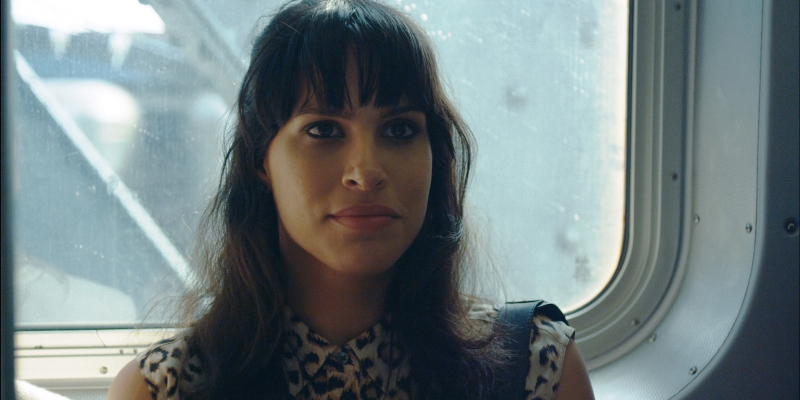
Desiree Akhavan wrote, directed, and stars in this edgy hipster comedy, playing her own version of the Brutally Honest Misanthropic Anti-Pixie Daydream Girl. She vacillates from hyperbolic-but-relatable despair to Ilana Wexler-esque repellant charm. It’s quirky, funny, and delightfully indie, chock-full of the inside queer jokes she’d later employ so well in The Bisexual. Since the release of this film, Akhavan has emerged as one of the most compelling and original voices of her generation, committed to authentic, unsparing portraits of queer millennial life. – Riese Bernard
2. The Handmaiden (dir. Park Chan-wook, 2016)
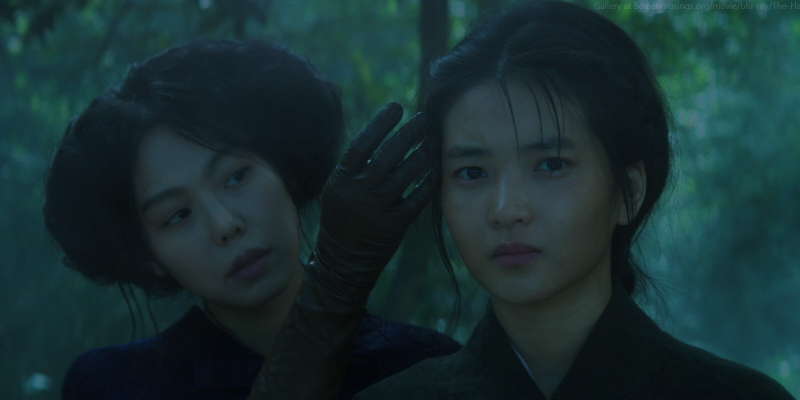
Park Chan-wook’s erotic psychological-thriller-meets-heist-movie based on the novel Fingersmith by Sarah Waters is a feat in measured but stylish storytelling. It’s violent and sexual, but those aspects of its narrative speak to larger themes and the immersive visual landscape of the tale so that there isn’t a moment of the movie that feels gratuitous. It shocks without that being all it’s trying to do. Because ultimately, these are very real characters ensconced in a very real love story. Revenge and romance are driving forces for the movie’s action, and several scenes teeter on the edge of desire and danger. – Kayla Kumari Upadhyaya
1. Pariah (dir. Dee Rees, 2011)
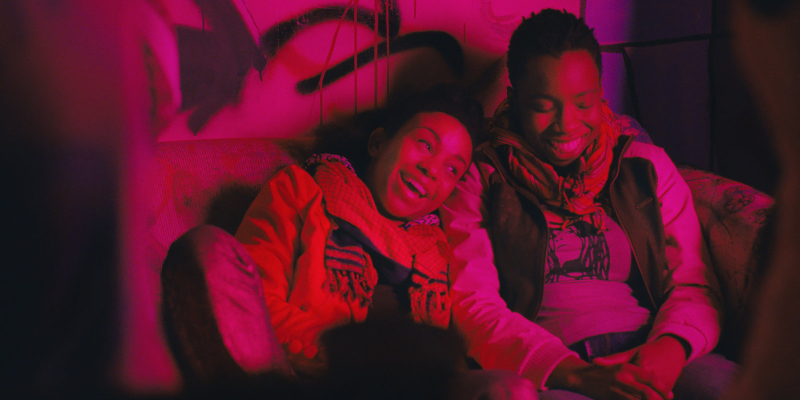
Back in 2018, still basking in the glow of Moonlight‘s upset of La La Land for the Best Picture Oscar, famed lesbian author Jacqueline Woodson asked Lena Waithe if she thought we’d ever have a “lesbian Moonlight.” Waithe quickly points out that we’ve already had one: Dee Rees’ stunning coming-of-age and coming out drama, Pariah. But like its central character, Alike, Pariah found itself adrift in a world not yet ready for its honesty.
Adepero Oduye astounds as Alike, the 17-year-old who navigates her identity along a Brooklyn bus route: literally shifting from the conservative, feminine girl her mother loves to the masculine-of-center woman who loves other women, as she makes her way across town. Pariah is, at times, painful to watch — in the way that things that feel too true usually are — but optimism persists throughout. – Natalie
The 15 Best Lesbian and Bisexual Movies of 2018
2018 was a stunning year for lesbian and bisexual women in film. First, just the sheer number of films that were available to us. This is the first time we’ve ever even been able to assemble a year-end list of best films. We might have been able to cobble together a short one last year, but there were enough movies this year that we had to leave some off. And this list doesn’t even include the very queer but somehow not exactly canonical gay favorites like Ocean’s 8 and Incredibles 2. Second, the production value of these films. Lesbian and bisexual movies have always been notoriously underfunded and it shows in areas as small as sound design and as big as acting. The caliber of talent that was drawn to making lesbian and bisexual movies this year is frankly unbelievable.
Finally — and in my opinion most remarkable — is the fact that none of the movies on this list trip over the same sad tropes that have been plaguing our film canon forever. There are some heartbreakers in here, but not in a cliched way. No one’s getting a bullet in the eyeball that lands in their brain as punishment for enjoying a single sexual encounter with another woman. In fact most of the movies on this list have hopeful, happy endings. I don’t need to tell you what a balm that was this year.
Below are the 15 best lesbian and bisexual films of 2018. (To be included on this list, these films had to be available in theaters or readily streamable in the United States.)
15. Lez Bomb
// stream it //
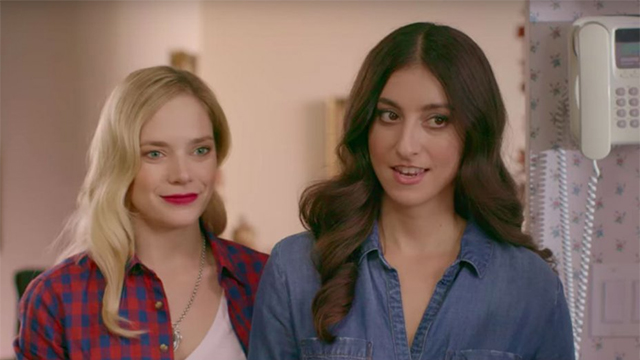
“Families are messy and complicated, and holidays are messy and complicated, and there are dozens of movies about women taking home their boyfriends (and men taking home their girlfriends) for the first time on Thanksgiving or Christmas — and all the messy, complicated hijinks that ensue. Lez Bomb, by writer/director Jenna Laurenzo, is the first feature film to take that age-old formula and put a queer woman at the center of it.” — Heather Hogan
14. Bad Reputation
// stream it //
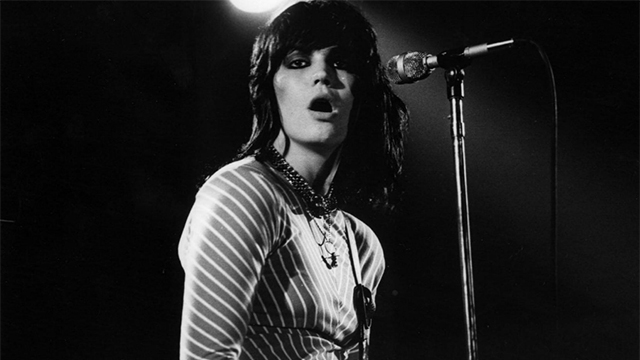
“Jett’s sexuality isn’t relegated to its own very special narrative segment, and that’s because it’s everywhere — as it should be for a rock star, and as it should be for all of us. Jett’s brand of queer is as much about Elvis being a pretty boy with swishy hips as it is Miley Cyrus famously trying to bed her, Kristen Stewart portraying her, lyrics that suggest anything but cisheteronormativity. Jett’s anti-war, pro-animal, pro-woman politics follow suit, less a label than they are actions: performing for troops in the Middle East and Bosnia, openly calling for an end to the seal slaughter while continuing to wear her decades-old leather, and fundraising women’s self-defense classes after the singer Mia Zapata’s horrifying murder. Bad Reputation reminds us that people with a knack for keeping their cool during trying times aren’t apathetic. Sometimes, they’re exactly what we, and our headphones, need.” — Sarah Fonseca
13. Annihilation
// stream it //

“Gina Rodriguez steals the show with a standout performance. And no I don’t just say that because she plays a confident and muscly soft butch lesbian with an undercut who opens a beer bottle in that way where you slam it against a table edge with your hand (something I have never been able to accomplish without hurting myself). But yes, those details are also important! She’s funny, delivering some of the movie’s rare but needed bursts of comedic relief. But she also encompasses the emotional complexity of what it really means to enter the shimmer. She starts with a lot of swagger that, like the shimmer itself, suddenly and disorientingly becomes something much more insidious. Rodriguez flips that switch in a wholly convincing way. Her character’s confusion and paranoia instantly pulls you right into that dark, uncertain place.” — Kayla Kumari Upadhyaya
12. The Feels
// stream it //
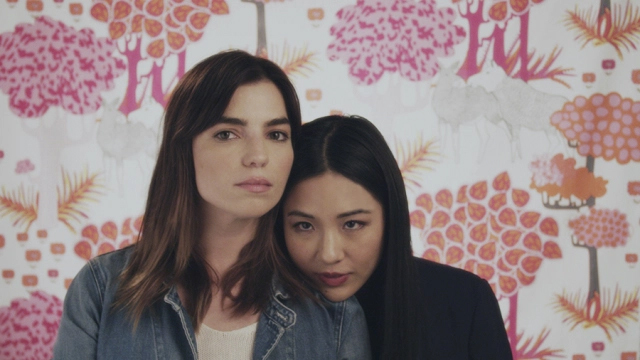
“The thing that surprised me the most about The Feels is how relatable it was. I’ve never had Andi and Lu’s specific relationship drama, but I’ve been in that cabin with that friend group more times than I care to count. Surrounded by people you love who also drive you bananas, the family members you constantly judge but need by your side, the lesbians you learn to like just because they’re lesbians, those lesbians lesbianing in the lesbianest ways, and that one dude everyone wants to throw into the river. It’s authentic and it’s tender and while the climax is a little bit rushed — eh hem — it’s a gay happy ending. And that, itself, is still revolutionary.” — Heather Hogan
11. Lizzie
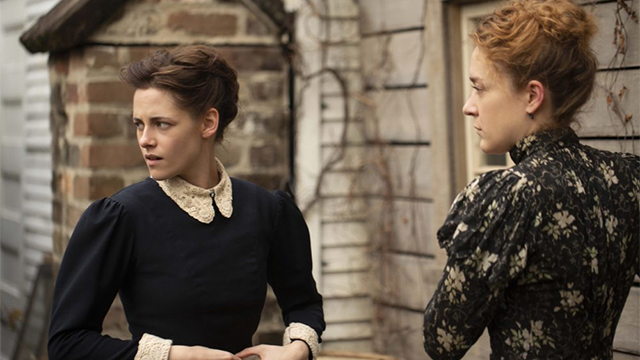
“Lizzie is brutal, historically attuned, and committed to exploring effeminate trauma and retaliation. As you might remember, Lifetime took a shot at a telling this story in four years ago with Christina Ricci in the lead role. While I enjoyed Lizzie Borden Took an Axe’s anachronistic blues rock soundtrack and Clea Duvall’s sour-faced Emma, it’s pretty impossible for a television network to craft a period slasher movie when its most risqué rating is a PG-14. Macneill also refrains from watering Lizzie into a mischievous bombshell. Grappling with health issues, reading books aloud to her pets, and living under her father’s thumb, she’s anything but cool. Perhaps this is what makes this movie so alluring: there’s a little of Lizzie in all of us.” — Sarah Fonseca
10. Sighted Eyes/Feeling Heart: Lorraine Hansberry
// stream it //

“Sighted Eyes/Feeling Heart, fourteen years in the making, is a great example of a work that thoughtfully and creatively layers ideas about gender and sexuality alongside race. In addition to readings from Lorraine’s private journals, the film features a ton of esteemed folks familiar with her, from feminist scholars and theater critics to legendary actors like Sidney Poitier and subversive writers like Ann Bannon; some of whom weren’t afraid to spar with one another’s ideas or Hansberry’s work on-camera. Like Lorraine’s second play, The Sign in Sidney Brustein’s Window, Sighted Eyes/Feeling Heart fearlessly and gracefully tackles the mix of identities—femininity and queerness among them—that Peck found too overwhelming.” — Sarah Fonseca
9. A Simple Favor
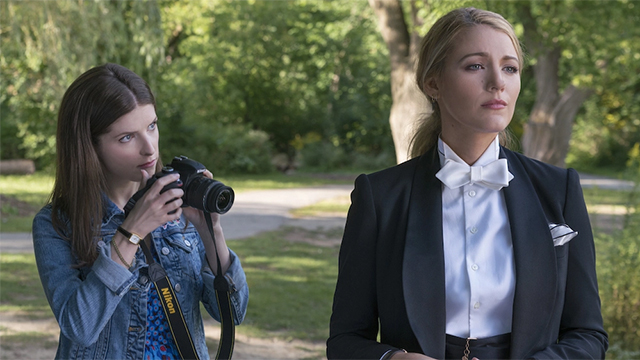
“A Simple Favor gets off on blending and blurring genres. Not quite an all-out dark thriller in the vain of Gone Girl, it does borrow from that genre but, even more accurately, from Lifetime movies. Incest, revenge arson, frame jobs, affairs, and secret siblings all make appearances in this tableau of fuckery. It’s a Mommi murder mystery that knows exactly how ridiculous is, the whole cast in on the joke.” — Kayla Kumari Upadhyaya
8. Blockers
// stream it //
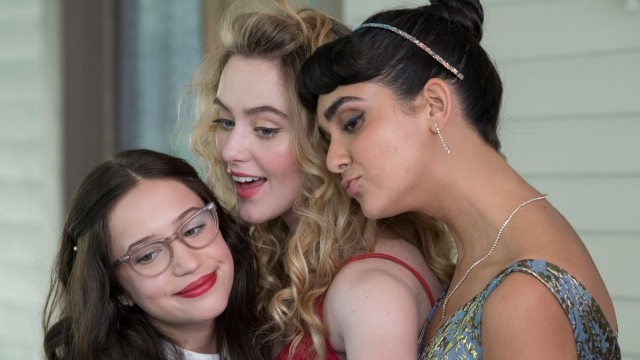
“These lesbians are adorable and they’re supported by the people they talk to about their sexuality; it’s actually one of the happiest gay storylines I’ve seen in a movie. It’s rare that a high school movie gives audiences a chance to root for one of the main girl characters to get another girl, but that’s exactly what this movie does.” — Mey Rude
7. Disobedience
// stream it //
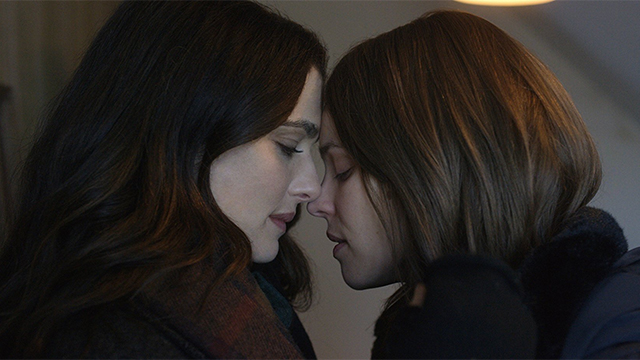
6. Can You Ever Forgive Me?
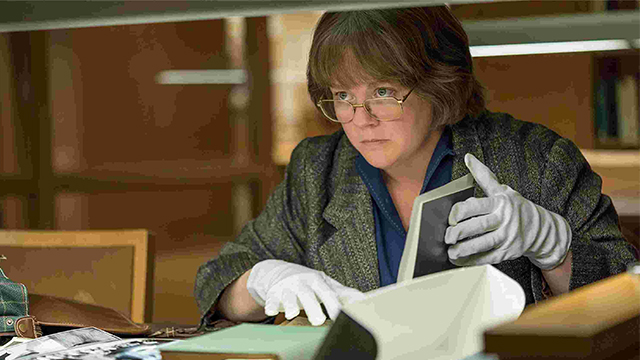
“Can you ever forgive me?” is a line from one of Lee Israel’s forged letters. It’s one she crafted for Dorthy Parker. In fact, she was so proud of it she called herself “a better Dorothy Parker than Dorothy Parker” and even used the quote to title her autobiography. Amazingly, Heller doesn’t seem to care if the audience is willing to forgive Israel. She has a better question, one we never ask about lesbians on TV and in film: Can you not see the humanity of this brilliant, complicated woman who never let herself be loved? — Heather Hogan
5. Colette
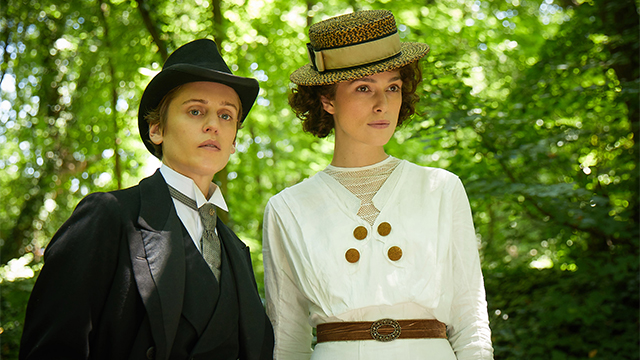
“The story of Colette is only a fragment of her life, the one in which France’s most prolific writer realizes she cannot be contained; not by her want of a dowry; not by her lack of education or formal training; not by the laws governing sexual conduct and gender presentation in turn-of-the-century Paris; not even by the room her husband locks her in to write her Claudine series, which he publishes under his name… On the whole, though, Colette is a lush, brilliantly scored, perfectly acted, beautifully directed biopic about an iconoclastic bisexual woman many modern scholars believe deserves to share the title of Greatest French Writer with Proust. Her legend is realized in Westmoreland’s film.” — Heather Hogan
4. The Favourite
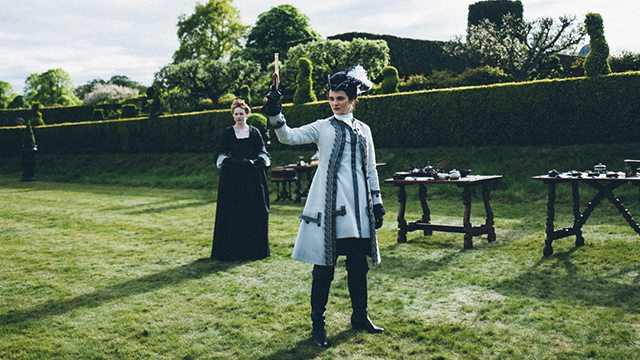
“The most stunning thing about The Favourite isn’t the dialogue, which features the word “cunt-stuck” more than once; or the improvised break dancing to Handel; or the cheeky camera work; or even the dazzling acting. The most stunning thing about The Favourite is how it slices open three queer women and lets their messy humanity bleed all over you, the way it adamantly refuses to allow you to love or hate any of them.” — Heather Hogan
3. The Miseducation of Cameron Post
// stream it //
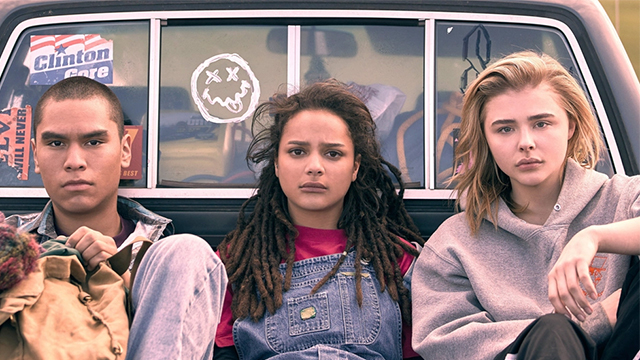
“There are lots of ways I could review Desiree Akhavan’s film adaptation of The Miseducation of Cameron Post. I could tell you that its unhurried character exploration, quiet charm, and nuanced social critique are Sundance catnip and no wonder it won the Grand Jury Prize when it premiered there this winter. I could tell you it distills the source material to its essence while maintaining the spirit of Emily M. Danforth‘s beloved novel. I could compare it to its queer cinematic matriarch — softer than But I’m a Cheerleader, the quintessential queer conversion therapy movie; sharper, too; less camp, more satire. Warmer than Disobedience, the other major lesbian movie centered on oppressive patriarchal religions thati hit theaters this year. Harsher — though still hopeful, in its way — than Hearts Beat Loud, the other coming-of-age lesbian indie film that hit theaters this year.” — Heather Hogan
2. Rafiki
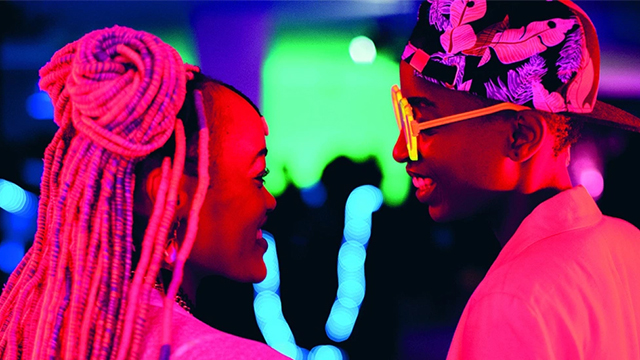
“Rafiki tells the story of two girls from rival political families who fall in love against the odds. Seven years in the making, Rafiki is directed by a Kenyan woman, Wanuri Kahiu, and features Kenyan women as lead characters. It’s based off the 2007 Caine Prize winning short story “Jambula Tree” by Ugandan writer Monica Arac de Nyeko. In short, it is Black African Woman Excellence at its best… an inconvenient love story for a country that wants to bury its queer history; present and past. But as history has proven so often, only one side of this story will be remembered: that of the victors.” — Kari
1. Heart Beats Loud
// stream it //
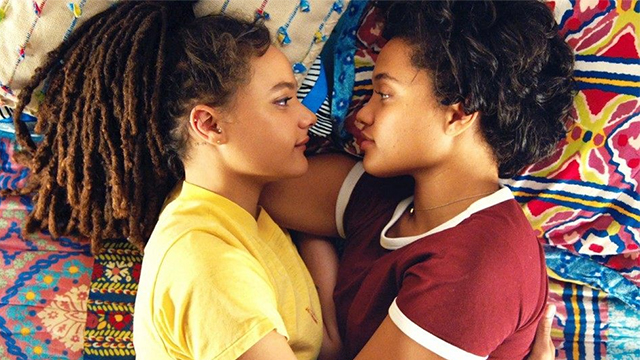
“I just love this movie. It’s light, perhaps even fluffy, and yes a bit twee. But you know what, who cares? When was the last time a motion picture centered itself on the premise that a teenage, mixed race, black lesbian is worthy of support and love from everyone surrounding her? It’s simple and tender and because of those things it’s groundbreaking. It sneaks right up on you and barrels into your heart.” — Carmen Phillips
14 Feel-Good Summery Lesbian Movies for Summer Lesbianing
Summer is for warm, feel-good movies! Unfortunately, the majority of lesbian movies end with women throwing themselves from the roofs of buildings or having their hearts obliterated. But there are a handful of lesbian films guaranteed to make you smile or swoon or just feel a general sense of contentment about the our beautiful queer world. Below are 15 such movies, hand-selected for you by Riese and Heather.
Bumblef**ck U.S.A. (2014)

Okay it does start out with a buried gay — but that leads a Dutch teenager to small-town America to make a documentary about queerness, and also of course she falls for an American girl. Their chemistry is sizzly, and Riese found this movie genuinely compelling.
The Intervention (2016)
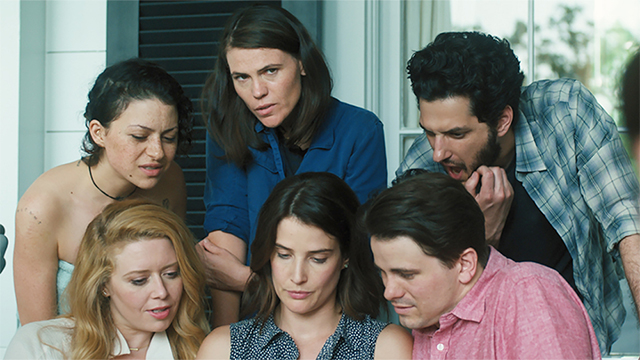
Kayla found Clea DuVall’s directorial debut charming (but extremely white). It’s ostensibly about a group of old friends coming together to have an intervention, but it turns out all the friends’ lives are falling apart in one way or another. DuVall also reunites with But I’m a Cheerleader‘s Natasha Lyonne and their on-screen chemistry is as sparkling as it always was.
The Summer of Sangailė (2015)
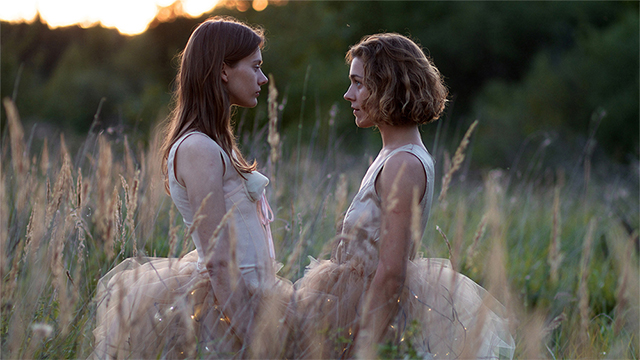
The Summer of Sangailė is a bittersweet lesbian coming-of-age story — emphasis on sweet. First loves aren’t usually forever loves, but the best first love stories capture the ache of discovery and departure in a good way, and this film absolutely hits that mark.
Summertime / La Belle Saison (2016) (France)
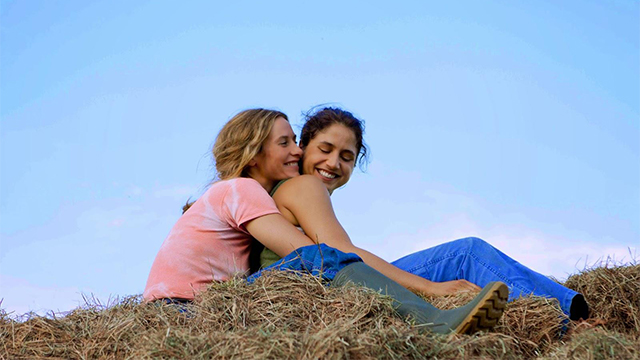
This French-Belgian romantic drama won the Variety Piazza Grande Award when it appeared at the Locarno International Film Festival. It’s fraught! But also empowering! It also covers a lot of things: small town French feelings about gayness in the ’70s, the women’s liberation movement in Paris, women’s healthcare. It’s another bittersweet story, but every major gay lady character gets a happy ending.
My Summer of Love (2004)
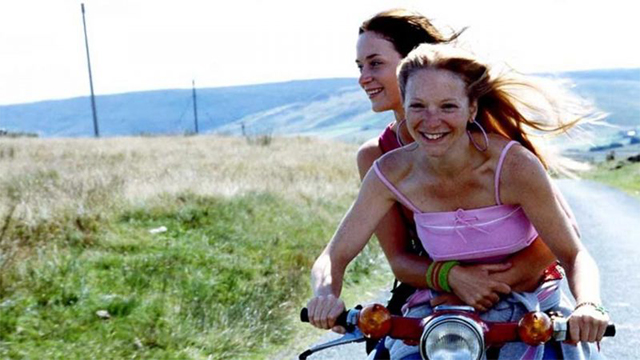
This film has the distinction of being one of the few movies in 2009 — when queer women were even less likely to exist on film, if you can believe it — of receiving a This Lesbian Movie Doesn’t Actually Suck award from Autostraddle dot com. “My Summer of Love’s poor little rich girl Tamsin [Emily Blunt] spends her boarding school suspension becoming really good friends with bored, working class Mona [Natalie Press],” Laura wrote at the time. “Their version of friendship includes kissing in rivers, lots of drinking and smoking and acting fancy, a nice little love and death pact, and motor scooters.” It’s another not-exactly-happy ending, but it’s worth the ride.
Princess Cyd (2017)
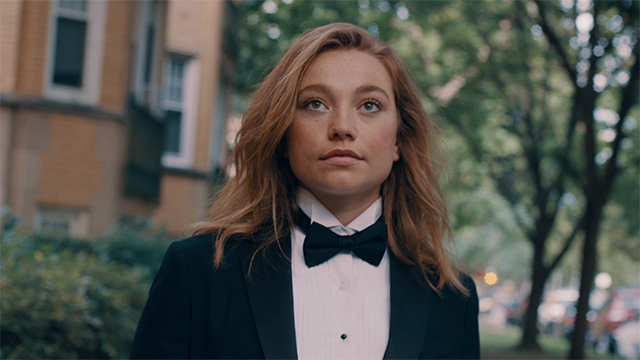
Heather called this the most hopeful queer film of 2017, and it made plenty of mainstream magazines’ best-of lists too. It’s a coming-of-age classic, including first queer love, but what’s refreshing about this one is there’s no hand-wringing from anyone about their sexuality and every woman with a major part comes away from their summer together more content and connected.
Water Lilies (2008) (France)
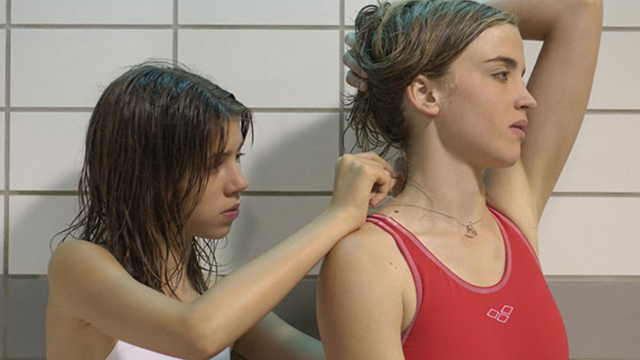
Hey, what if I told you this was… a coming-of-age story? You’d be shocked, I know. Well, it is! This one, however, involves a love triangle, synchronized swimming, and sex-spit (kind of) ten years before Disobedience. It also happens to be Heather’s partner’s favorite film trailer.
Under the Tuscan Sun (2003)
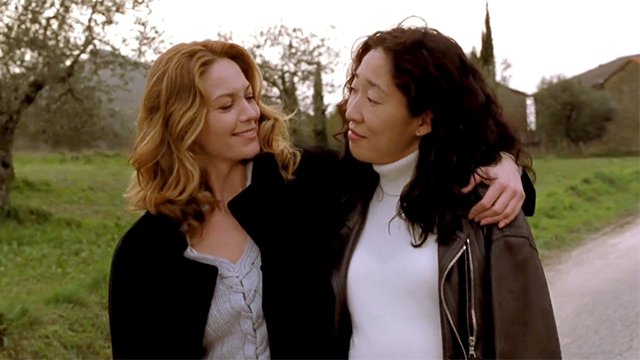
Sandra Oh expert Kayla Kumari Upadhyaya is pleased to preemptively inform you that Under the Tuscan Sun “is definitely a lesbian movie.” Sandra Oh plays Diane Lane’s lesbian best friend who follows her to Tuscany after her girlfriend, Kate Walsh, leaves her. This one’s all about middle-age rediscovery and delicious pasta and everyone gets a family and a very happy ending.
D.E.B.S. (2004)
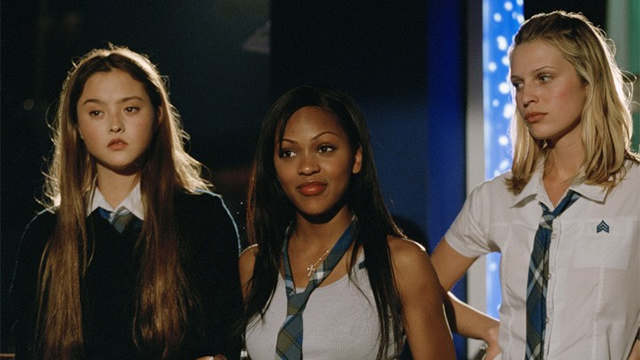
Summer is for superhero movies and lucky for you D.E.B.S. is both one of the greatest lesbian movies and greatest superhero movies of all time. It’s campy as all heck and super low-budget (Angela Robinson made it for $300,000) but it’s a masterpiece. It also stars Holland Taylor name-checking Jodie Foster. Please pair your enjoyment of this classic with Rachel’s thoughts on the film after watching it for the first time at our senior staff retreat in 2016.
Hearts Beat Loud (2018)
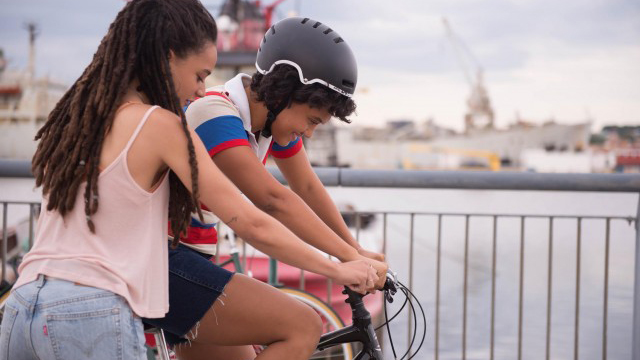
This is the best lesbian summer movie ever made. Ever. EVER. Just go watch it already, if you haven’t, and then enjoy Carmen Phillips’ brilliant review.
Rough Night (2017)

Rough Night seems like it’s going to be one thing but it’s actually kind of the opposite of that, and if the studio had just let the editor keep the bachelor party dudes out of it altogether it’d actually be a really great comedy. There are not one, nor two, but three queer women in this movie, and one of them isn’t even Kate McKinnon (and her truly wacko Australian accent!). Give it a try. There’s actually a lot to enjoy.
Mosquita y Mari (2012)
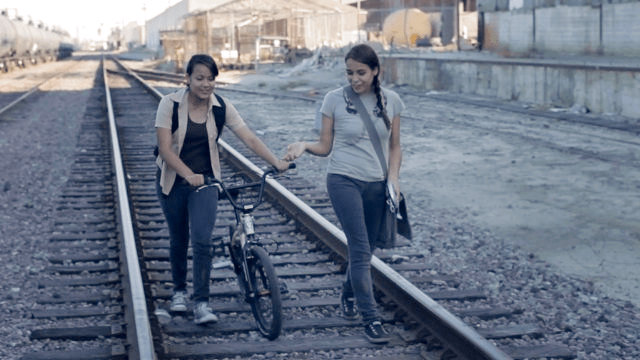
Ara promises Mosquito y Mari will make you relive all your teen gay feelings and Gaby Rivera says it “finds the bits that makes us who we are and blasts them onto a screen.” I think you’ll find them both to be very correct. Yes, it’s bittersweet but it’s also beautiful and tender and smart and warm and full of soul.
Desert Hearts (1985)

Desert Hearts‘, um, climactic sex scene still holds up as one of the best lesbian sex scenes in the history of lesbian movies (with absolutely no male gaze whatsoever) — and so does the story. It’s sort of like… if Carol and Therese switched personalties and worked all that out in the middle of the desert in the middle of summer in 1959.
Battle of the Sexes (2017)
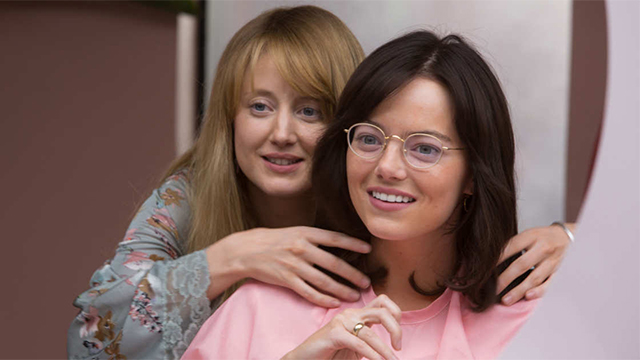
Summer is also for sports movies and this biopic about Billie Jean King’s infamous tennis match with Bobbie Riggs is a great sports movie; the fact that there’s a breath-taking lesbian awakening in the middle is just icing on the cake.
What are your go-to feel-good movies for summer?
The Top 30 Dykes on Bikes on TV and in Movies
Bicycles on TV mean independence, coming of age, letting go, transformation! Motorcycles on TV mean bad bois! So it’s no surprise that lesbian and bisexual TV characters are on bikes all the time. I was recently watching Kiersey Clemons and Sasha Lane’s glorious coming-of-age indie comedy, Hearts Beat Loud, tears raining down my face during their bicycle scene, and a whole reel of other dykes on bikes on TV and in movies started playing in my mind. And now I have made that imaginary slideshow into a list, just for you.
As always, this list was compiled by me and Riese Bernard and Carmen Phillips and Valerie Anne and Natalie and Kayla Kumari Upadhyaya.
Paige McCullers, Pretty Little Liars
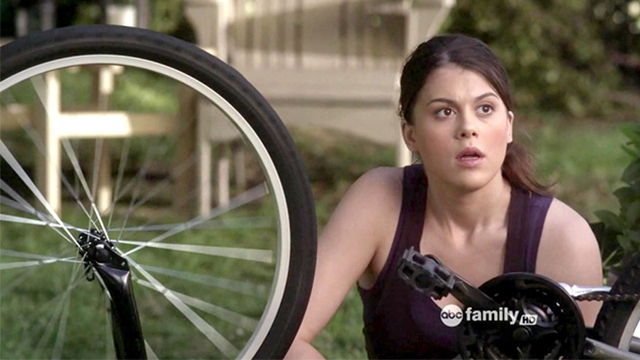
Paige got up to all kinds of shenanigans on her bicycle, most notably riding it to Emily’s house in the middle of the night in the middle of a thunderstorm to apologize for taking out her internalized homophobia on Emily and also unexpectedly kissing her — and then she got back on it and pedaled off into the lightning, soaked in rain and shame and a little hope too, my precious chaotic baby gay lamb. Also notable: Paige lost a bike race to Emily on purpose near the end of the show, a sweeping gesture to show she wanted to stay and make things work with her first love. (They did not work.)
Naomi Campbell and Emily Fitch, Skins
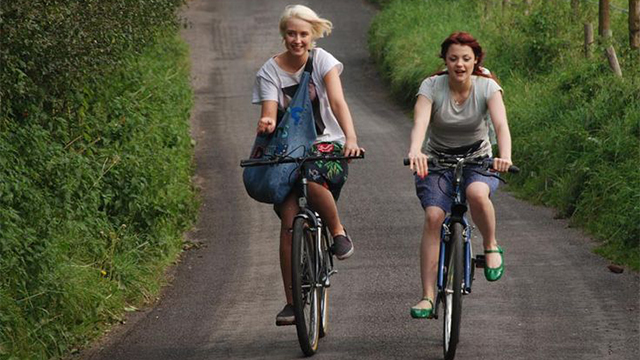
Skins works really hard to make sure you don’t miss the symbolism of Naomi and Emily taking off on bikes together; for example, the song that’s playing when they’re on their way to the lake to skinny dip and scissor is called “Jump In.” They also ride a bike in the follow-up season, an upgraded moped, because their relationship is upgraded. There are zero bikes in Skins Fire, which is frankly just further proof that bollocky wankshite doesn’t exist.
Therese Belivet, Carol
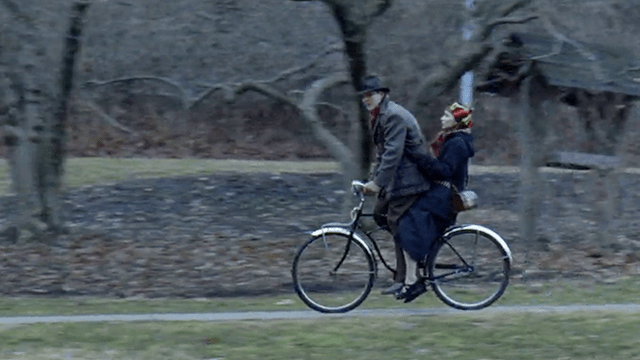
Therese on or near a bicycle is a perfect thing because it’s when her misandry is at its all-time highest. In the first few minutes of Carol, she lets Richard pedal her to work while refusing to discuss his damn boat tickets, and then later when he’s pushing his bike beside her she just flat out asks him if he’s gay because she’s gay.
Team Dana, The L Word
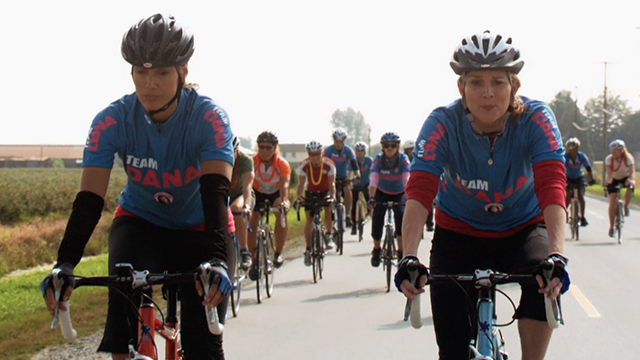
“Lifecycle” is one of the best episodes of the fifth season of The L Word, which is the second best season of The L Word, and the only one besides season one that is not physically painful. (Most of the time.) In this episode, everyone wears Team Dana jerseys and rides a thousand miles for breast cancer and all their secrets and lies and cheating come out around the campfire. Also Bette tells Tina she likes her butt in her cycling shorts.
Kate Messner, Everything Sucks
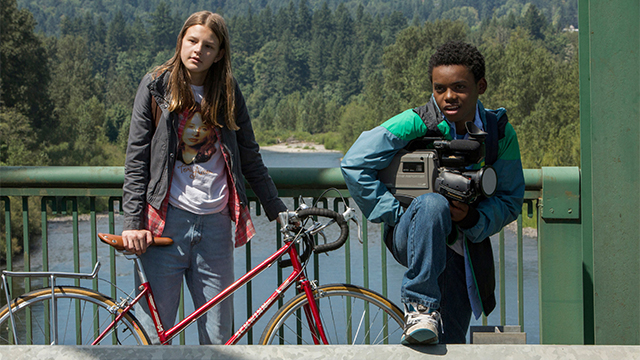
Nothing says “lil’ ’90s lesbian” like a ten-speed Schwinn, so it makes perfect sense this was Kate’s choice of transportation for scooting around Boring, Oregon in her flannel shirts and Tori Amos tees.
Sam and Rose, Hearts Beat Loud
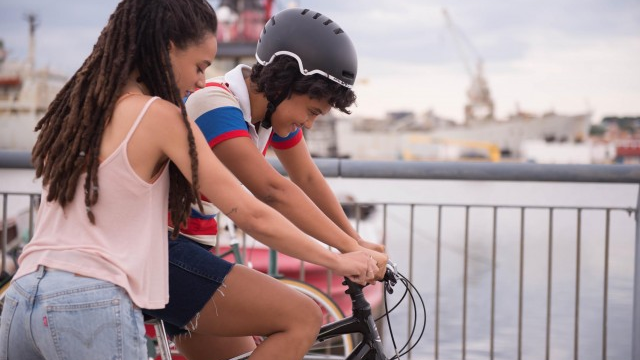
Kiersey Clemons is on this list not once, not twice, but three times. Most recently she was finding her way on a bike as Sam in Hearts Beat Loud. I don’t want to spoil this scene for you — it’s climactic! — but let’s just say she reclaims her trauma with the help of her girlfriend doing an activity usually written as father/daughter bonding in a very father/daughter movie. It queers the trope!
Chase, Easy

Oh hey again, Kiersey! In a season one episode of Netflix’s drama, Easy — titled “Vegan Cinderella” — Chase falls for a girl and gives herself a crash course in lesbian things like cycling in Chicago and not eating meat. The results are mixed. She doesn’t get killed by a car, which is lucky because she doesn’t know how to wear a helmet and swerves all over the place while texting in the dark. But she also can’t keep up the charade. My favorite part of the episode is when she scuffs up her new bike helmet on purpose, right outside the bike shop where she bought it, to make it looks like she’s owned a bike for more than 30 seconds.
Diggy, Dope
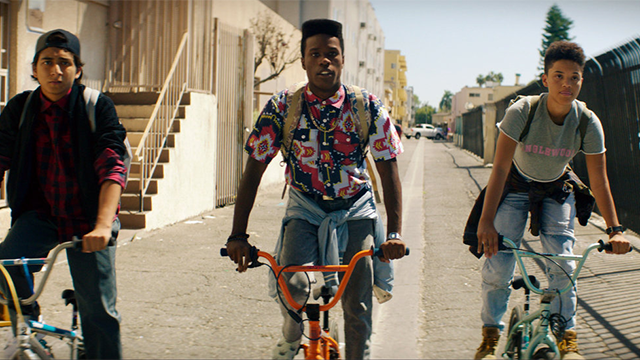
As Diggy in Dope, Kiersey pedals around Inglewood with her best friends Jib and Malcom between band practice and trying to get girls to like them back. They spend so much time on their BMXs in this movie, always moving, trying to figure out who they are and how far they can go.
Rosa Diaz, Brooklyn Nine-Nine
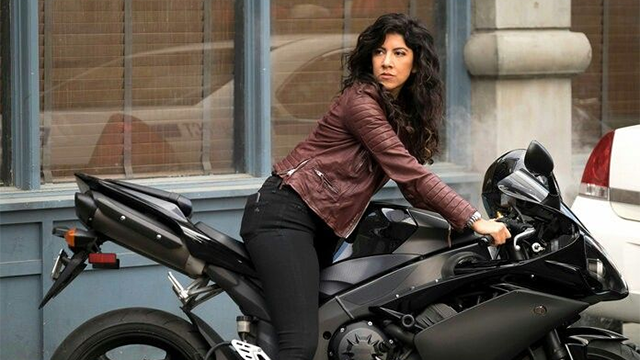
Rosa loves her motorcycle more than most things, and it sure does love her back. Look at them together! She’s a hardass, but that doesn’t stop her from using her bike rush to the aid of her friends, including zipping Terry to the hospital when his wife is in labor. (Steph Beatriz really does ride a motorcycle; she started taking lessons in 2014.)
Quinn Fabray, Glee
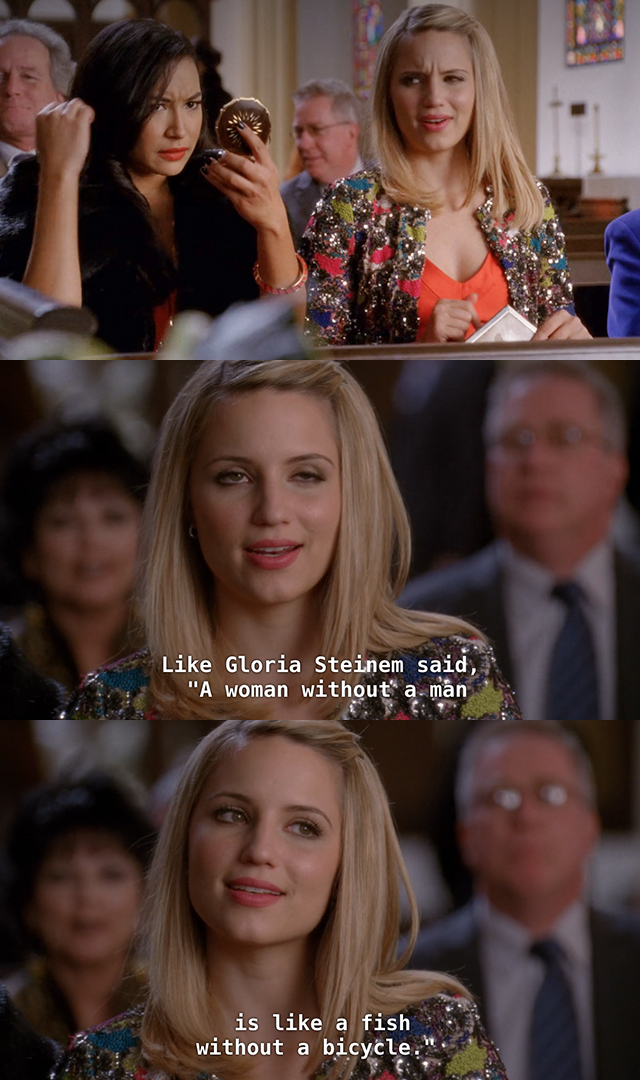
And then she had sex with Santana Lopez. Twice.
Alex Danvers, Supergirl
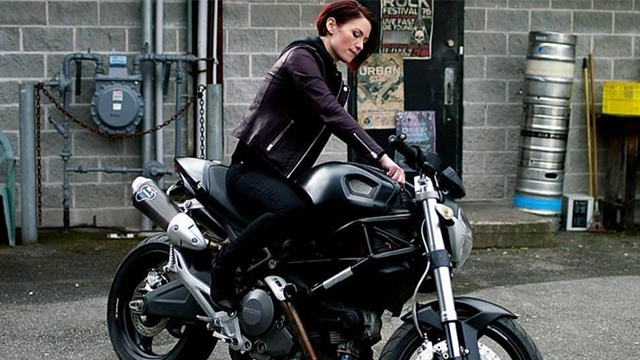
When your sister can fly, you’ve gotta have an almost-as-cool way to get around!
Root and Shaw, Person of Interest
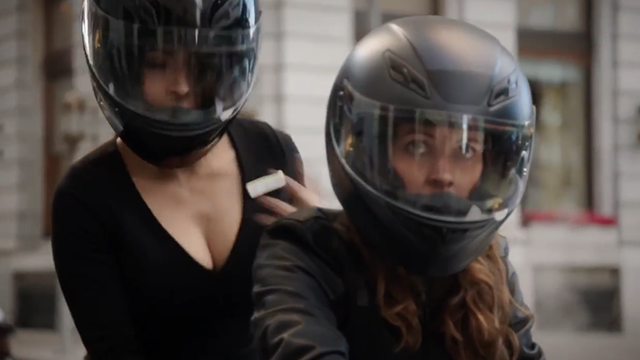
Sometimes you and your girlfriend are tracking the same bad guy and she shows up on her motorcycle outside the place you were having a shoot-out and just happens to have an extra helmet waiting for you so you can hop on the back of her bike and ride to safety. Sometimes.
Villanelle, Killing Eve
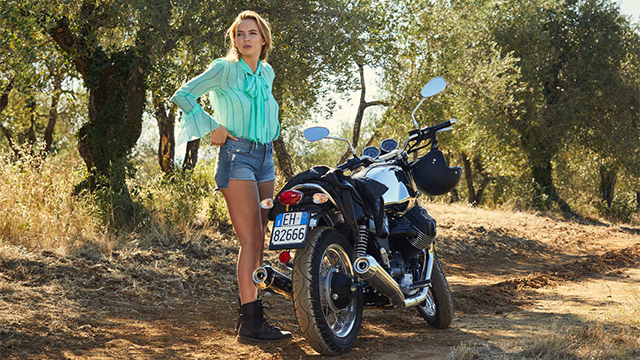
I cannot watch Killing Eve due to my aversion to blood and, um, killing. However, Killing Eve expert Kayla Kumari Upadhyaya tells me this is when Villanelle first shows up in Tuscany to kill Eve and she leans against her bike and eats an apple with a paring knife while a song called “When a Woman Is Around” by a band called Unloved plays in the background — and I guess that’s when everyone knew she was gay for Sandra Oh! (Villanelle, I mean. Everyone already knew Kayla was gay for Sandra Oh.)
Alice Pieszecki and Shane McCutcheon, The L Word
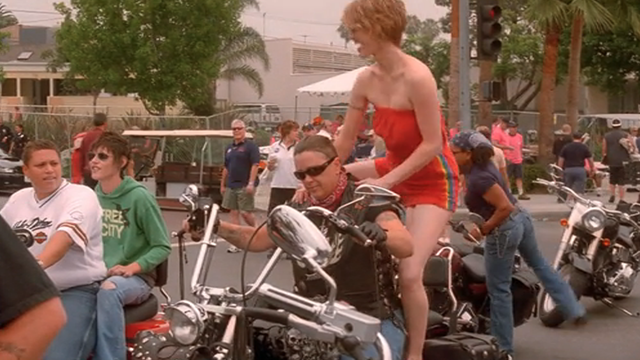
When Alice can’t join Dana on her corporate float at Pride in season two, she and Shane hop on the back of Harley-Davidsons with some legit Dykes on Bikes instead. Alice tells the corporate float gatekeeper to write that on her clipboard and then takes her rainbow romper to the front of the parade.
Laura and Aubrey, Casual
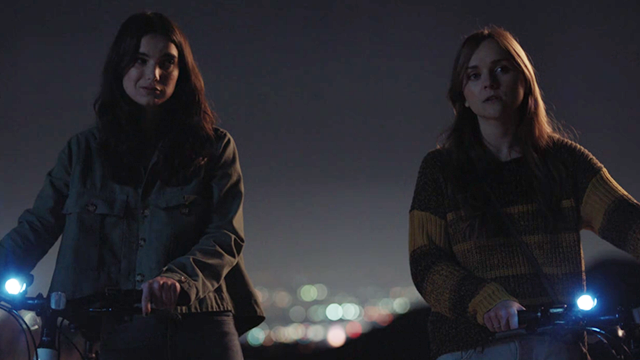
In the second season of Casual, Laura and Aubrey finally come to grips with their feelings for each other after — what else! — a bike ride. They kiss on right on the mouths after looking out over the city and contemplating the ephemeral nature of love and the fact that they stole those bicycles.
Tasha Williams, The L Word
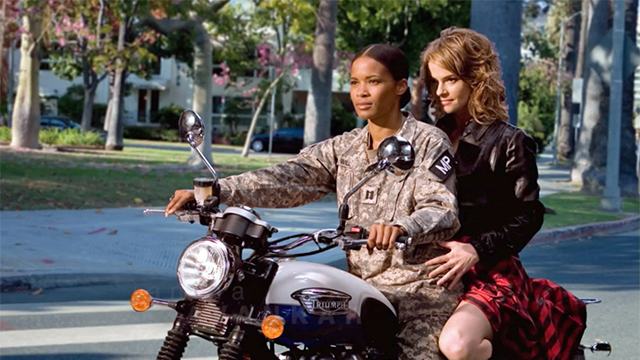
Tasha rode her bike in the opening credits of The L Word and she also rode it around the military base before she quit the army to protest DADT. Alice didn’t deserve Tasha or her bike, but they sure do look good together on it.
Kat Edison, The Bold Type
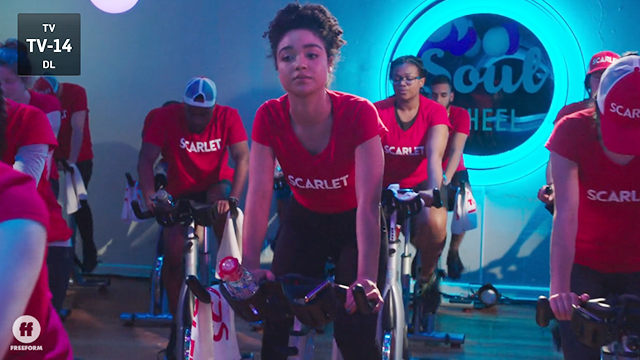
Kat realizes she’s a grown-up queer person who wants to actually try to be in a grown-up queer relationship when she’s in a SoulCycle class and the instructor is yelling about upping the torque and downing the torque and mostly just letting go and not being afraid to chase what you want most in this cruel, hard world. Kat gets off her bike and runs (literally runs!) straight to Adena’s apartment to kiss her in the streetlight/moonlight and promise she wants to try.
Nomi and Amanita, Sense8
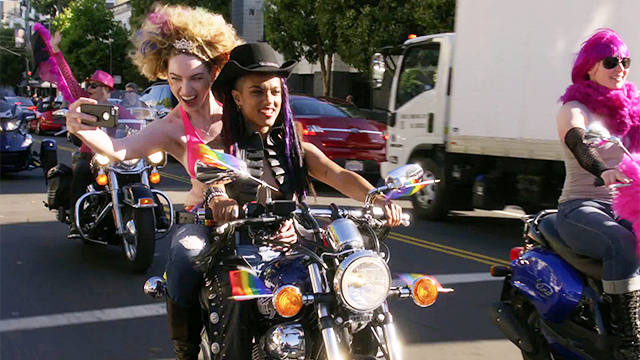
Amanita’s motorcycle gets a lot of play in Sense8. She rides it in the Pride parade with Nomi, but she also uses it to chase down an agent who resurfaces and goes after her girlfriend. It’s sexy and functional.
Ilana and Abbi, Broad City
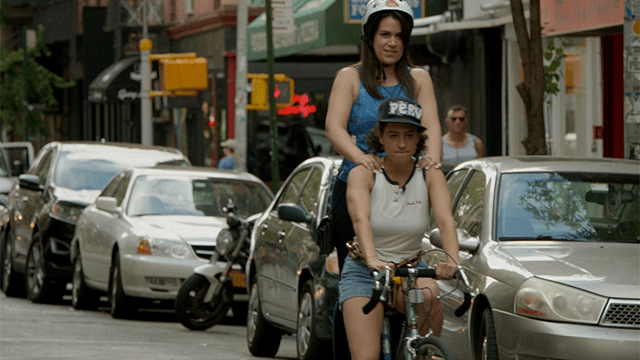
Ilana has a lot of mishaps with her bike, but it has produced two fan favorite moments on the Broad City. 1) Her song “I Bike” and its follow-up hit “I Tweet.” 2) The image of her true love Abbi standing on the back of it as they ride through Manhattan after a day of madcap adventure that almost has Ilana ditching her boy pal on an important day (because she only wants to hang out with her true love Abbi).
Emily Fields, Pretty Little Liars
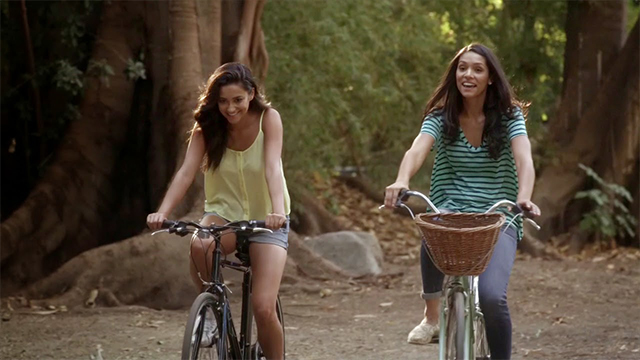
I think of Paige as Pretty Little Liars‘ main cyclist, but Emily Fields was always using bicycles to seduce women! She also very often pushed her bike beside her on the sidewalk in downtown Rosewood, especially when Spencer was around, which I assume was a power move to try to seem gayer than her best friend. (It didn’t work.)
Did we miss anyone? Hit is up with your favorite dykes on bikes in the comments!
Kiersey Clemons’ Heart Beats Loud for Young Black Queer Women: The Autostraddle Interview
Kiersey Clemons’ star is on the rise, and she’s bringing all of herself along for the ride.
A young biracial black woman who’s upfront and matter-of-fact about her queerness, with a smile that cameras eat up and an infectious laugh – nabbing Vogue features, Coachella Instagram photos, red carpet walks; scoring superhero franchise movies (she’s going to be Iris West in the upcoming Flash stand alone feature!), parts in buzzy Netflix shows (she’s Chase in Joe Swanberg’s Easy), and doing press tours at Sundance. Those are the building blocks of a hot, young career for almost any Hollywood actress. As Kiersey’s sails through those milestones, it’s refreshing. She’s refreshing. An out queer black femme who’s somehow also an old school Hollywood starlet, all rolled into one.
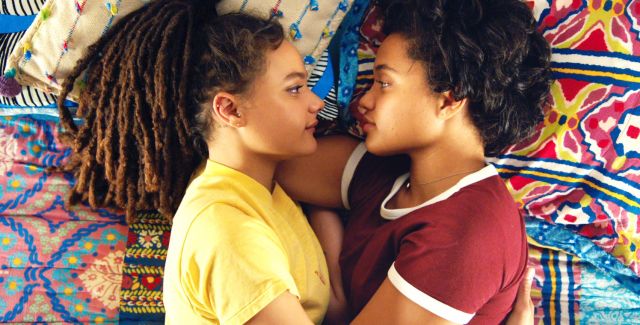
Clemons brought all her talents and charm to bear on the new indie film Hearts Beat Loud, which just opened nationwide. In it Kiersey plays Sam, a teenager spending her last summer at home before college. She has a loving dad in Frank (Nick Offerman) and a young sweet lesbian summer romance with Rose (queer biracial actress Sasha Lane). Rose and Sam are going to be the your new favorite summer romance; I’m willing to bet on it. I reviewed Hearts Beat Loud for us last week, it’s sweet and funny and chopped full of love. A lot of that love comes from Kiersey. She finds Sam’s purity of heart and effortless cool. She holds on tight and never lets go.
Kiersey hopped on the phone with us to talk about the movie, building her career, unicorns, and a whole lot more! (Also, we laughed. We laughed a lot. I told you – it was infectious.)
Carmen: Having watched Hearts Beat Loud, I was immediately drawn to the young love story between Sam and Rose. I think our readers will be, too!
You and Sasha Lane perfectly capture a mutually supportive, sweetness between your characters. We don’t often see that in lesbians on screen — particularly for women of color. How were you and Sasha able to develop that relationship? How was it to play out those relationship dynamics together?
Kiersey: Well, Brett Haley, our director, and Mark Ash, our writer, were very collaborative with Sasha and I. We all sat down and we talked about what we felt, what we wanted to change or add, and how we felt those scenes would go. We talked about our own personal experiences.
Can I be honest? The whole movie was kind of structured, and we mostly stuck to script — EXCEPT for my parts with Sasha. We really wanted to just go with it, and play with it. We wanted to figure out what felt right, you know? And our writer and director… being these white, middle aged, cis straight men [chuckles]… they really wanted to lean in to us. They wanted to make sure it felt as relatable and honest to us as possible.
Sasha and I wanted to bring something to the screen that we wanted to see. Our characters are two girls like us. We asked ourselves, what are we not seeing? What’s lacking in cinema? I’m really proud of how it turned out. It’s just really beautiful. And it feels so good. It feels so different from anything that we’ve seen. And, I love that they [Sam and Rose] are so young. I was so happy to show young lesbians. We’re so used to sexualizing young people on screen. It’s sometimes feels like filmmakers don’t know how to shoot anything else. Or maybe they’re afraid that people won’t want to see it. Either way, it becomes that if they’re young, then they have to be sexualized. I’m happy that we got the chance to keep this real.
https://www.instagram.com/p/Be2L375Bhtn/
Carmen: It’s great to hear you talk about your opportunity to explore with Sasha on set. You’ve already had a variety of memorable roles in your career. As an out actress, you’ve been lucky enough to play three different black lesbian or queer characters; Diggy in Dope, Chase in Easy, and now Sam in Hearts Beat Loud. That’s just… really, it’s unheard of!
It’s important that actors have the opportunity to play lots of roles and not be typecast, obviously. At the same time however, when the universe aligns so that an out queer women of color actually gets to play one on screen, it can feel like a unicorn is getting its wings.
Kiersey: [Laughs] YES!
Carmen: Have those opportunities helped you grow?
Kiersey: Hmmm… you know… I think right now is the most exciting time to be a person who looks like me and loves the way that I do. I’ve been given so many opportunities to tell stories that are relatable to my own life, because there are people out there who are finally getting the opportunity to tell real stories. Stories that are honest and are a reflection of the world that we live in.
And so, it makes sense to me that I would be “getting my wings” right now!
Both: [Fall out laughing together]
Kiersey: It’s just… it’s our time! And I know it’s still rare. I recognize that I am so lucky that I’ve gotten to do it so many times. I can only hope that the pool of movies with queer characters, and queer people of color, keeps growing. I hope that there are more of those movies. I want more of us out there, sharing those roles.
Carmen: And I think that one of the reasons you’ve become so memorable is that you find the specificity in each of those characters. It’s never, “Oh let’s go get Kiersey because plays this broad stereotype of gay really well.” They’re always full fledged, independent, different people with their own life circumstances.
Okay. Going back to Hearts Beat Loud — I had NO IDEA you could sing! You do your own vocals for the movie. You’ve got real pipes, girl! Where have you been keeping this secret talent hidden? Did you do any special preparation for the singing in this film?
Kiersey: Thank you! I did work on the songs with my vocal coach. Her name is Sarah Lee. She’s also queer. And she’s Jewish. And she’s a bad bitch. So, yes! [Laughs] I know the outlet I’m talking to! Let’s all hold Sarah up in the light! I’ve been working with Sarah for a few years. And when this project came my way — the genre from Hearts Beat Loud is just so different from what I’m used to singing. It’s not one that I naturally lean into necessarily. In the beginning, I was a little intimidated. I sat down with Sarah, and she really helped me break it down.
Then I met up with Keegan DeWitt, who wrote and composed all the movie’s songs, and Jeremy Bullock, who helped me with my keyboard and my sampler. They were both so encouraging and had such patience.
Carmen: We should definitely talk about Sam and her relationship with her dad, Frank. It’s still a rare joy to see mixed race families on film. On top of that, stories about young lesbians coming of age are usually focused on family strife. Hearts Beat Loud sidesteps those tropes.
Kiersey: I’m really glad that came through.
Carmen: It felt like you were able to establish a bond with Nick Offerman on set and clearly telegraph it to the audience. Were there any tricks to building your little on screen family?
Kiersey: Yeah! I mean the first day we met was actually our first rehearsal with the music team. So, we were picking up these instruments that we could play on some level, but weren’t necessarily professional or fluid in. That broke down any barrier of pride or uncomfortability between us. We had to be vulnerable and make embarrassing mistakes in front of each other. That brought us together. We had something to immediately bond over.
Carmen: We recently covered your Met Gala red carpet look for the website. You’re everywhere lately and we’re definitely happy to be charting your growth. It’s a lot of fun to watch your meteoric rise as an young, out black woman. There was quite literally NOTHING like this when I was coming up. So, I want to ask you a classic ‘90s Teen Beat style question: If you had something you could say to your LGBT fans, what would it be?
Kiersey: [Laughs] Oh wait! Noooo! I wasn’t ready! That’s so hard! [Laughs more]
Carmen: Don’t feel any pressure! You can literally just say, “Hey, what’s up! I see y’all in my mentions! I see y’all on Instagram!”
Kiersey: [Still laughing] But, that’s true though!! Like I don’t usually respond to my Instagram DMs or whatever, but when it’s a gay black woman going, “Hey girl! I see you!” I always feel a little at home. I feel like, “Oh you won’t harass me or stalk me and kill me in my sleep. We’re family.” It’s community vibes.
I love the community vibes.
Carmen: Yes! We’re out here, loving each other! To quote the incomparable Issa Rae, “I’m rooting for everybody black!”
Kiersey: YES!! Damn, I’m so glad we got to chat.
Carmen: Me too! And since no one’s kicked me off the phone yet, here’s one last fun question: It might surprise some of our readers that you got your start doing Disney Channel. Do you have a favorite DCOM (Disney Channel Original Movie) from when you were kid? What’s the one childhood movie you could watch over and over and never get tired of?
Kiersey: That’s absolutely no contest. Cheetah Girls. Shout out to Raven Symoné!
Both: [Fall out laughing]
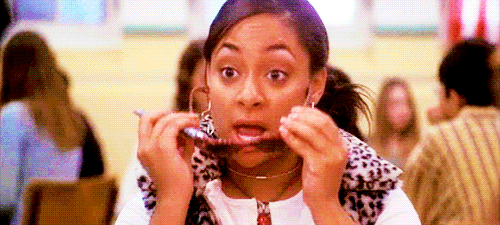
Hearts Beat Loud is now open nationwide, you can check here for local showings and premiere dates. If you haven’t already, you can follow Kiersey on Instagram or Twitter as she continues her Hollywood take over.
“Hearts Beat Loud” is the Quirky, Queer Rom-Com We All Deserve
Ah, young love. Young, sweet, gentle love — set to the rhythm of indie pop rock and against the backdrop of Brooklyn sunsets.
If I told you that a new indie comedy was coming out this weekend about the summer crossroads of young adulthood, with ironic hipster t-shirts and bike rides through the park, you’d probably nod along. This isn’t a new concept. It would likely star one of the Fanning sisters (Dakota or Elle), or Emma Stone before them. Their love interest would be someone like Tom Holland or Timothée Chalamet or one of those Chrises (I guess, I don’t keep up with young famous white boys, to be honest).

This isn’t that. This young love comedy is about two queer women of color — actually played by two young, out queer women of color starlets. Both of whom happen to be the talk of Young Hollywood; with multiple Sundance movies under their belts, Vogue features, and Met Gala red carpets between them. Inserting Kiersey Clemons and Sasha Lane into the middle of a film like Hearts Beat Loud is admittedly a small change to the trope of this movie’s genre, but that one change makes all the difference.
Kiersey Clemons stars as Sam, a UCLA bound, pre-med student soaking up her last summer at home. She’s effortlessly cool, but feels approachable. She’s the girl in your high school who always knew the perfect classic rock album for any occasion, but wouldn’t make fun of you for sticking to Spotify’s Top 40 playlist.
Sam’s father, Frank (Nick Offerman), is an affable single dad who runs a vinyl record store in Brooklyn on its last legs. They clearly have a close, loving relationship that feels lived-in and warm on screen. They’re each other’s complementary opposite. She lectures him about paying bills and the dangers of impulsive purchases; he forces her to take study breaks for “Jam Sesh Time,” playing and writing music together in their living room. It’s in those jam sessions that Sam and Frank best communicate, letting their homemade lyrics fill the spaces of their heart.

At its core, Hearts Beat Loud is a coming of age story for them both. Sam, getting ready for college across the country, and her dad, who’s preparing to support her through those changes while also reconsidering the routine of his life now that she’s leaving. They’re both staring down the precipice of a new chapter. Nick Offerman, who on some level will always be Park and Recreation’s grumpy Ron Swanson to me, is given opportunity to show the full colors of his range. Other productions often slot him into supporting character roles, but Hearts Beat Loud proves that he has a lot more to offer than his signature deadpan routine.
Really, I’m here for the intense summer romance between Sam and Rose (Sasha Lane, from this fall’s upcoming Miseducation of Cameron Post). I suspect you will be, too. Sam falls head over heels for Rose, hard and FAST. Together they make gentle jokes and stroke thumbs and their eyes look like heart emojis. Everything around them just feels… bubbly. And full and new and, quite simply, great. I don’t remember the last time I got to see young black lesbians have the opportunity to love each other like this on a big screen. In all honesty, the reason I can’t remember is probably because I never have.

Since they’re young lesbians, particularly young lesbians of color, on some level you watch the movie waiting for the other shoe to drop. At every corner you look, waiting for tragedy to strike. I’m so delighted to tell you this, it never happens. Sam and Rose’s relationship pain comes from typical teenage strife, the ticking stopwatch of Sam’s impending cross-country move hanging overhead. No one’s parents kick them out of the house, scared and alone. No one is assaulted or abused or subjected to a hate crime. They’re simply kids in love who check out art, listen to music, ride bikes, and speak in over-dramatic teenage proclamations.
It all feels normal. In fact, it’s purposefully normal. A merciful reprieve from the trend of films that, the few times they have lesbian protagonists at all, only serve to remind us of the hellscape that being queer in America can be. Instead, Hearts Beat Loud gives us a sweet love story that’s perfectly suited for an air-conditioned escape on a hot summer’s day.
Sasha Lane and Kiersey Clemons so beautifully fall into their characters that by the end of the film it hardly feels like they are “acting” at all. They find the truth in these young girls. They resist any urge to over perform, instead letting their relationship develop naturally on screen.
Here’s the breakdown: I just love this movie. It’s light, perhaps even fluffy, and yes a bit twee. But you know what, who cares? When was the last time a motion picture centered itself on the premise that a teenage, mixed race, black lesbian is worthy of support and love from everyone surrounding her? It’s simple and tender and because of those things it’s groundbreaking. It sneaks right up on you and barrels into your heart.

Which isn’t to say that they aren’t missteps. The excellent supporting cast — including Toni Collette, Ted Danson, and Blythe Danner — are mostly underused. The script leaves a few too many loose ends. The film’s third act, which largely focuses on Offerman’s Frank, left me wanting. Some might find the overall premise lacking in high stakes. The film gets through these rough patches based on the sheer strength of the cast’s heartwarming energy. Everyone feels happy to be there, so it’s hard not to enjoy watching them.
My only real sadness is that I didn’t have this around when I was 18 and a film dork who haunted my local indie house in Detroit’s suburbs because 100% I would have seen it at least four times. I would’ve said I loved it for the acting or the music, written by Keegan DeWitt and sung by Clemons and Offerman. But, I know that young me would’ve actually had a heart thumping crush on Sam, and I like to think that I would’ve seen parts of myself in her. It would’ve provided me with comfort, in ways that I couldn’t yet articulate that I needed.
See Hearts Beat Loud, if only so you can get on the Kiersey Clemons train before it turns into a bandwagon, because I promise you that’s where we’re heading. She’s an honest to goodness star. The camera lights up around her. Hearts Beat Loud is a vehicle that finally allows her to shine.
Hearts Beat Loud begins its nationwide rollout this weekend. You can check here for local listings and premiere dates.
